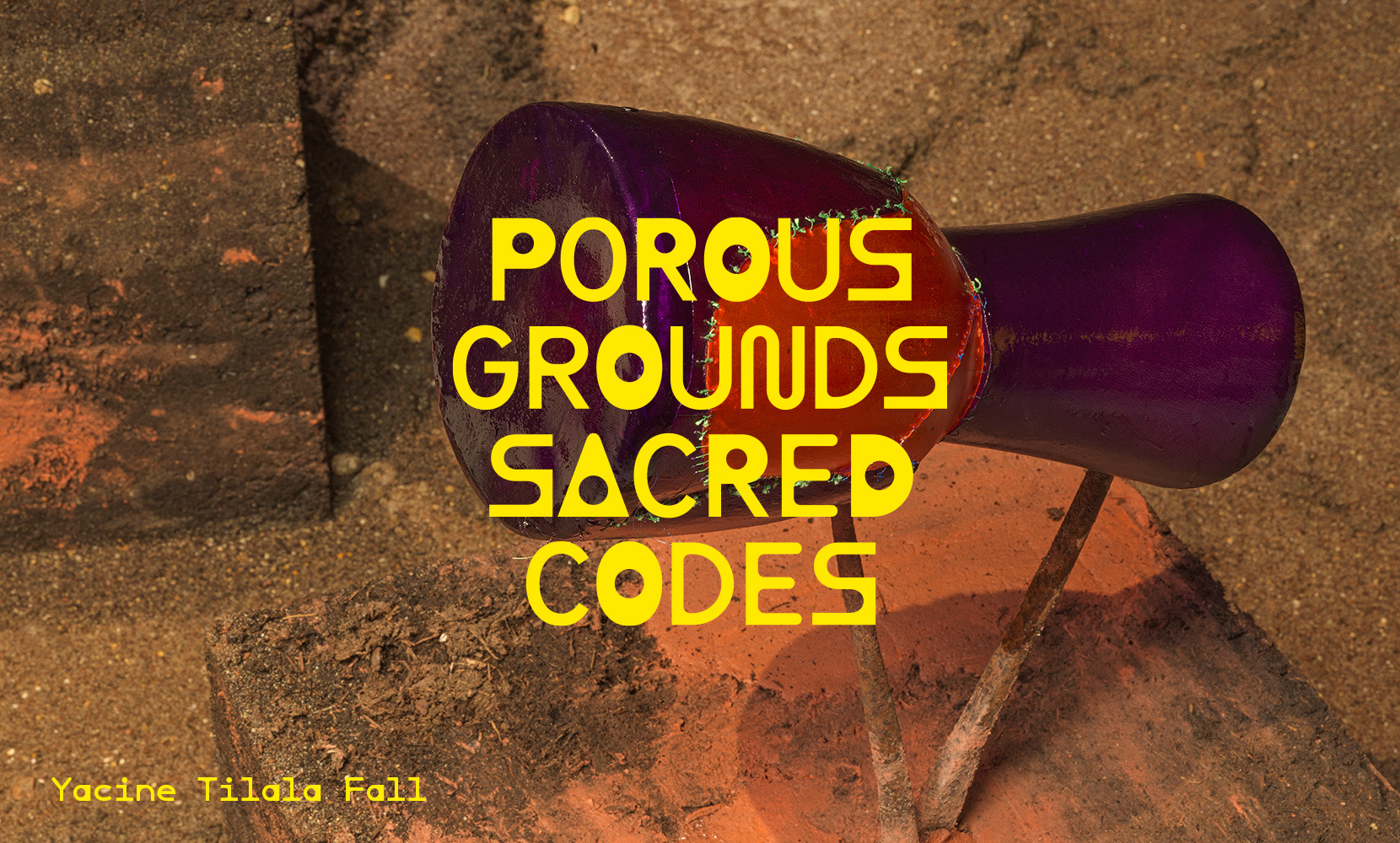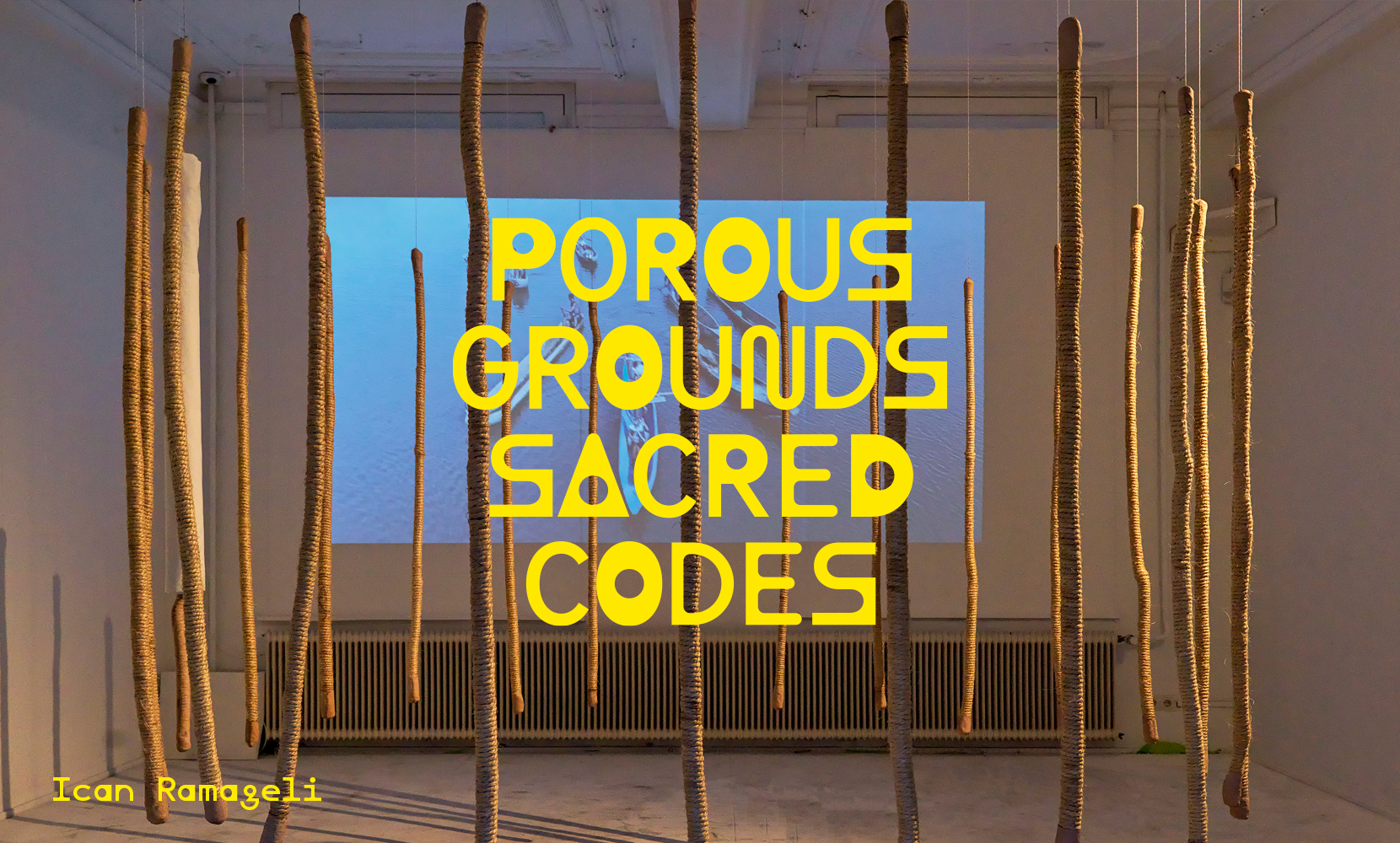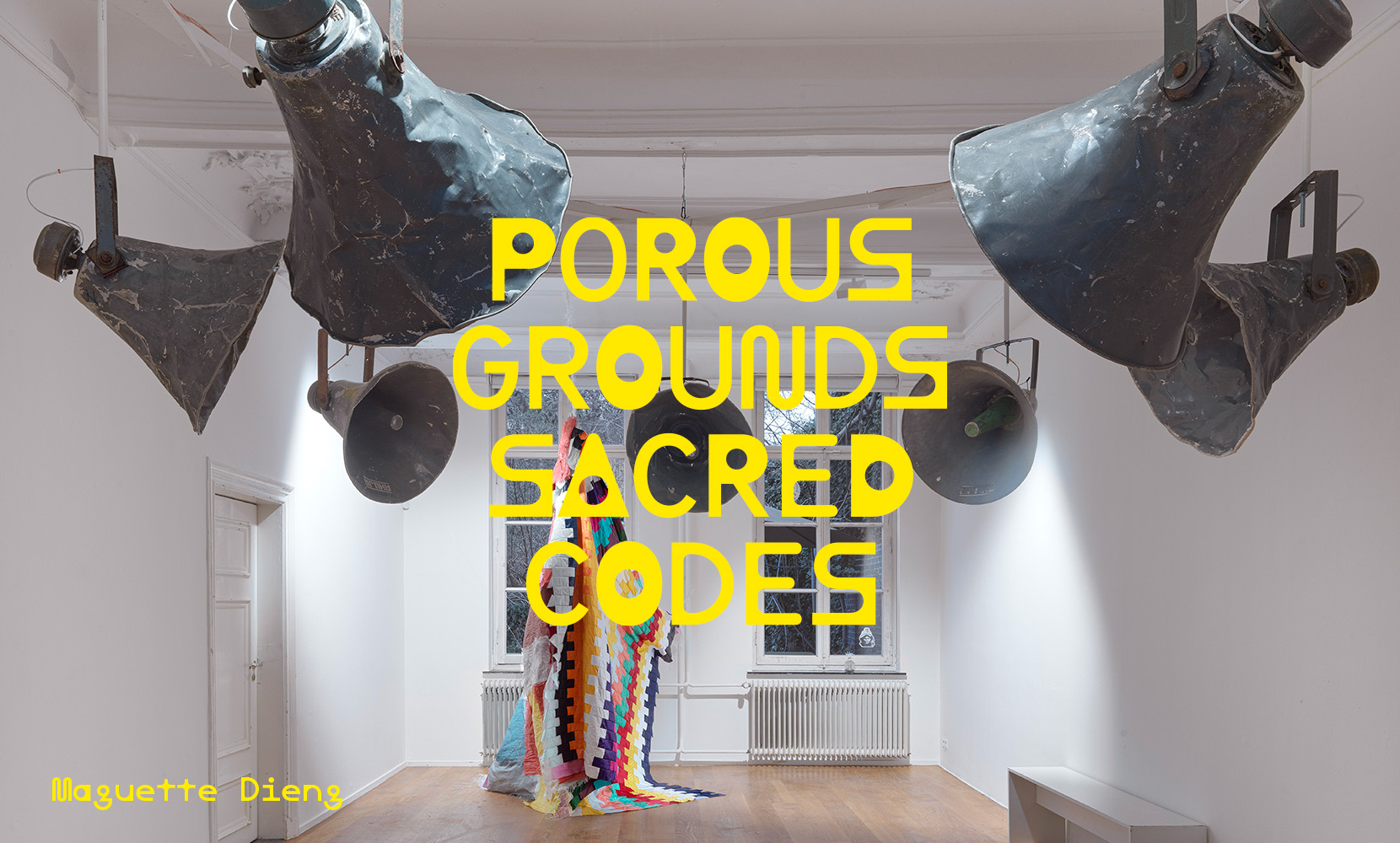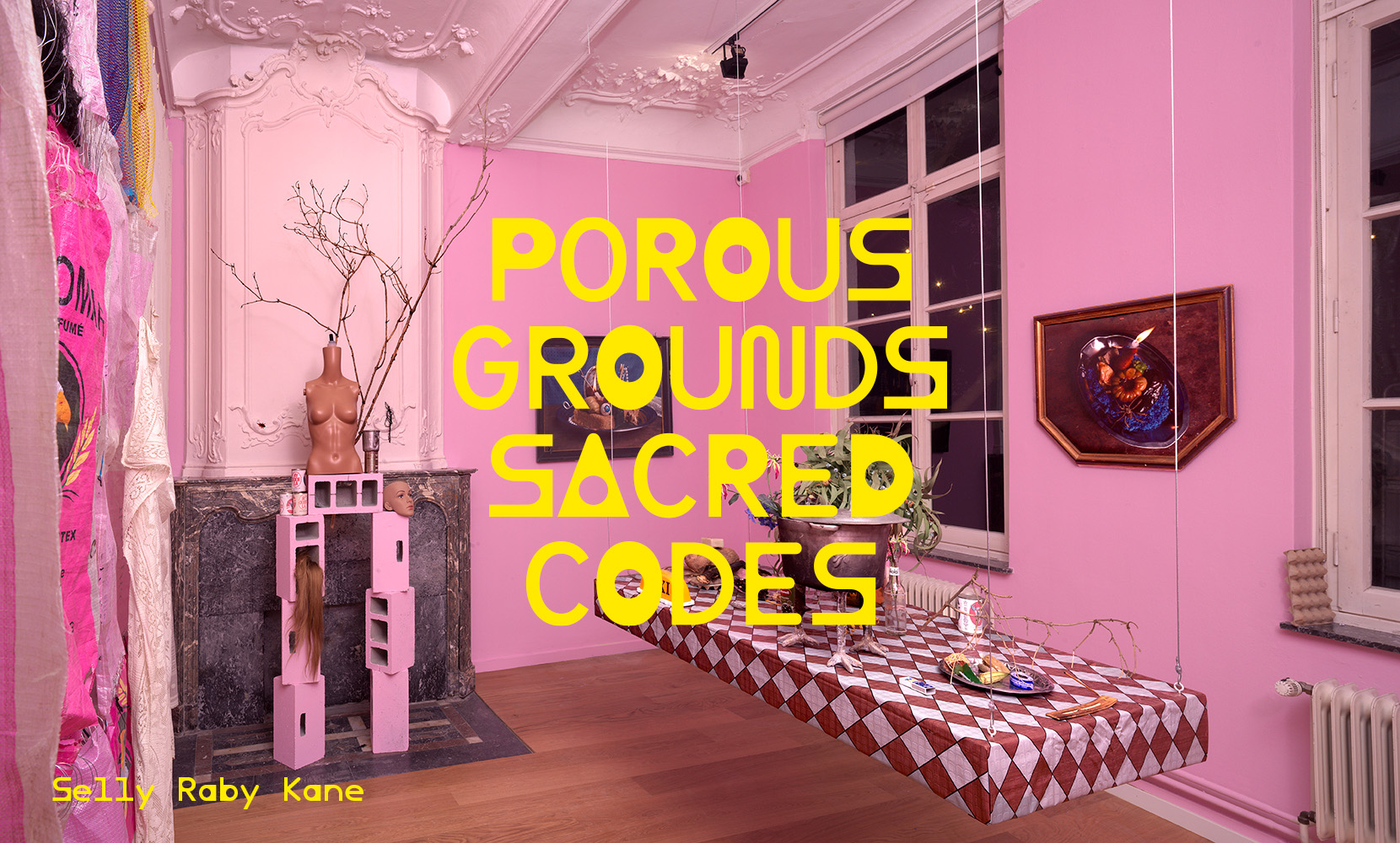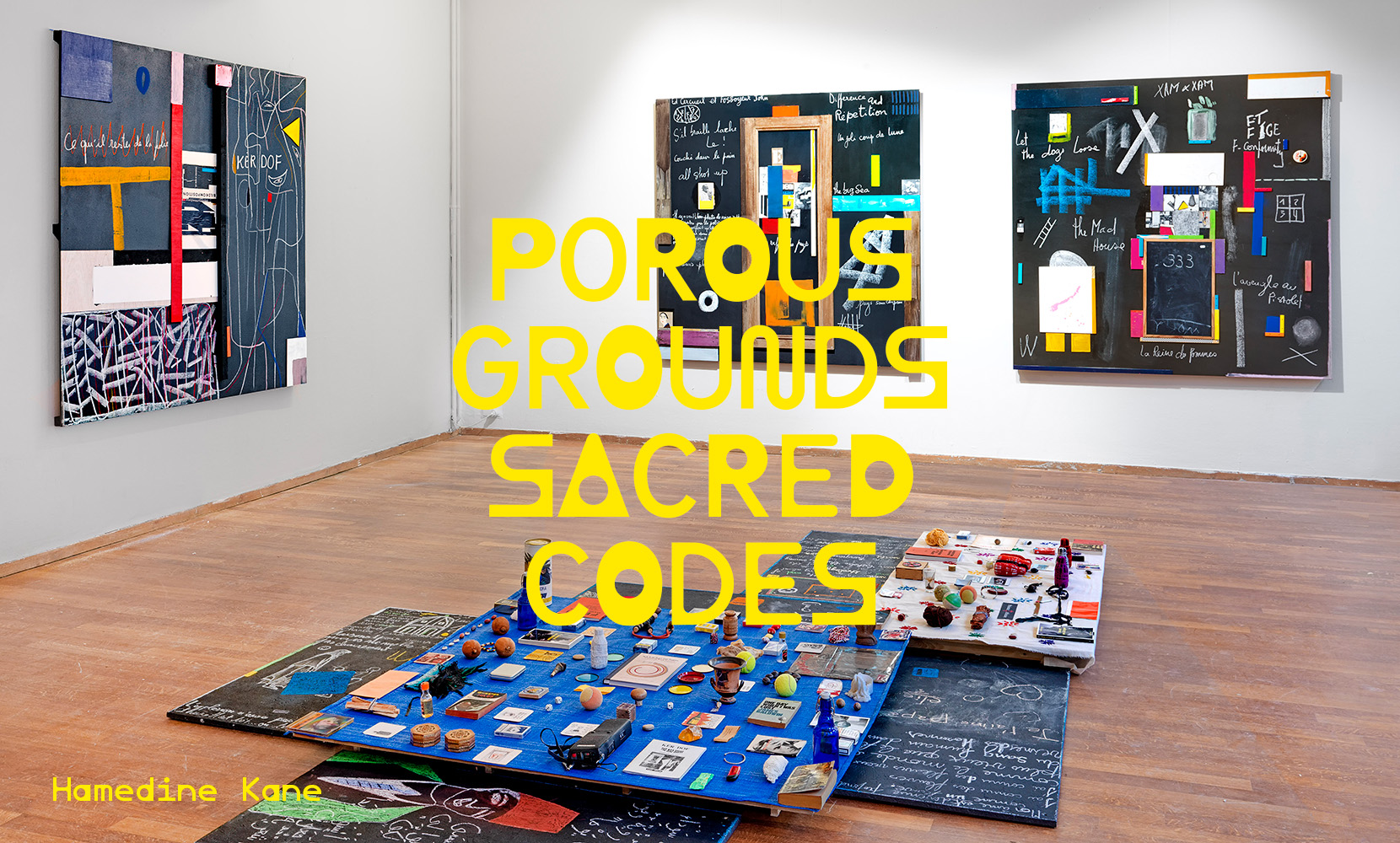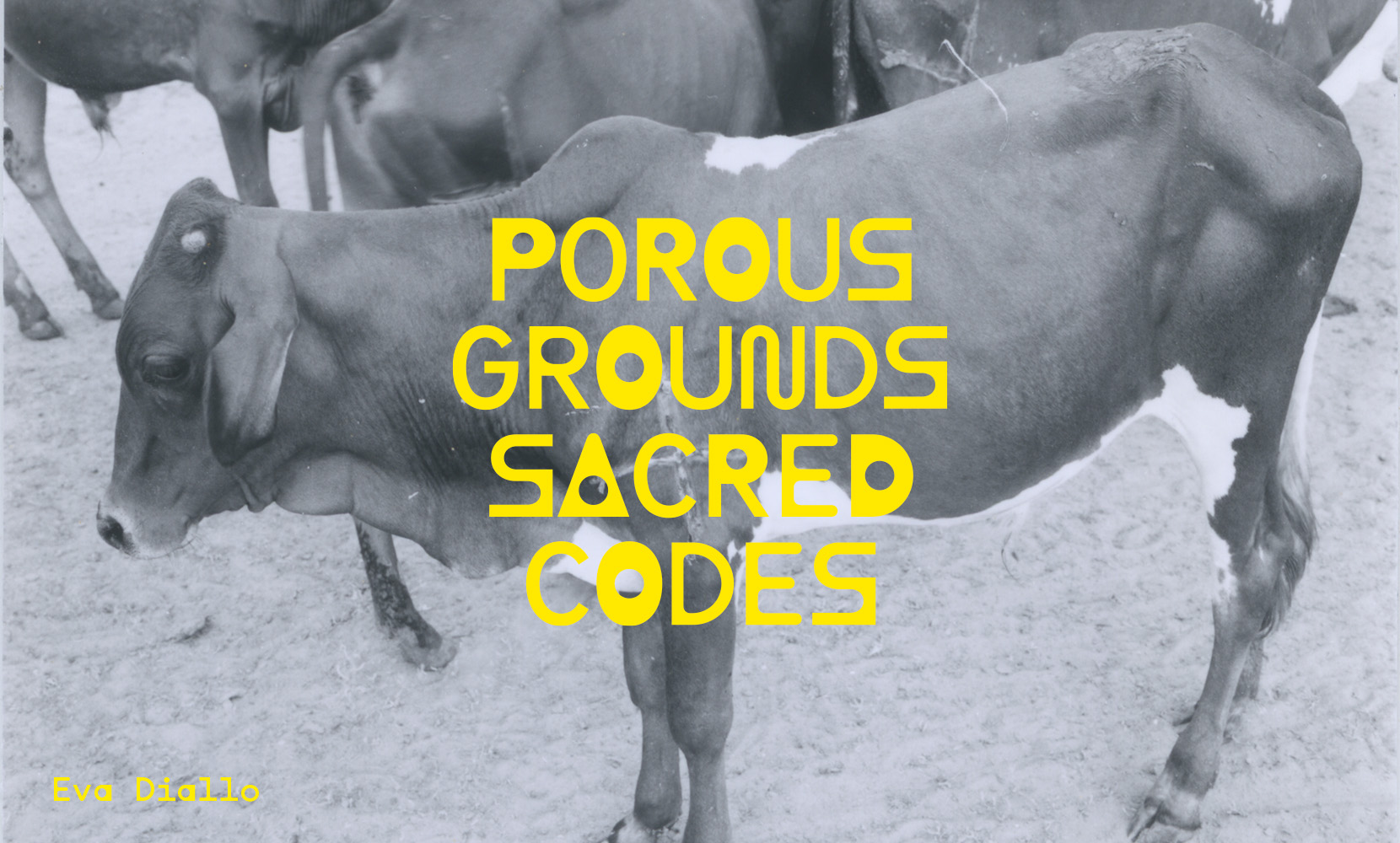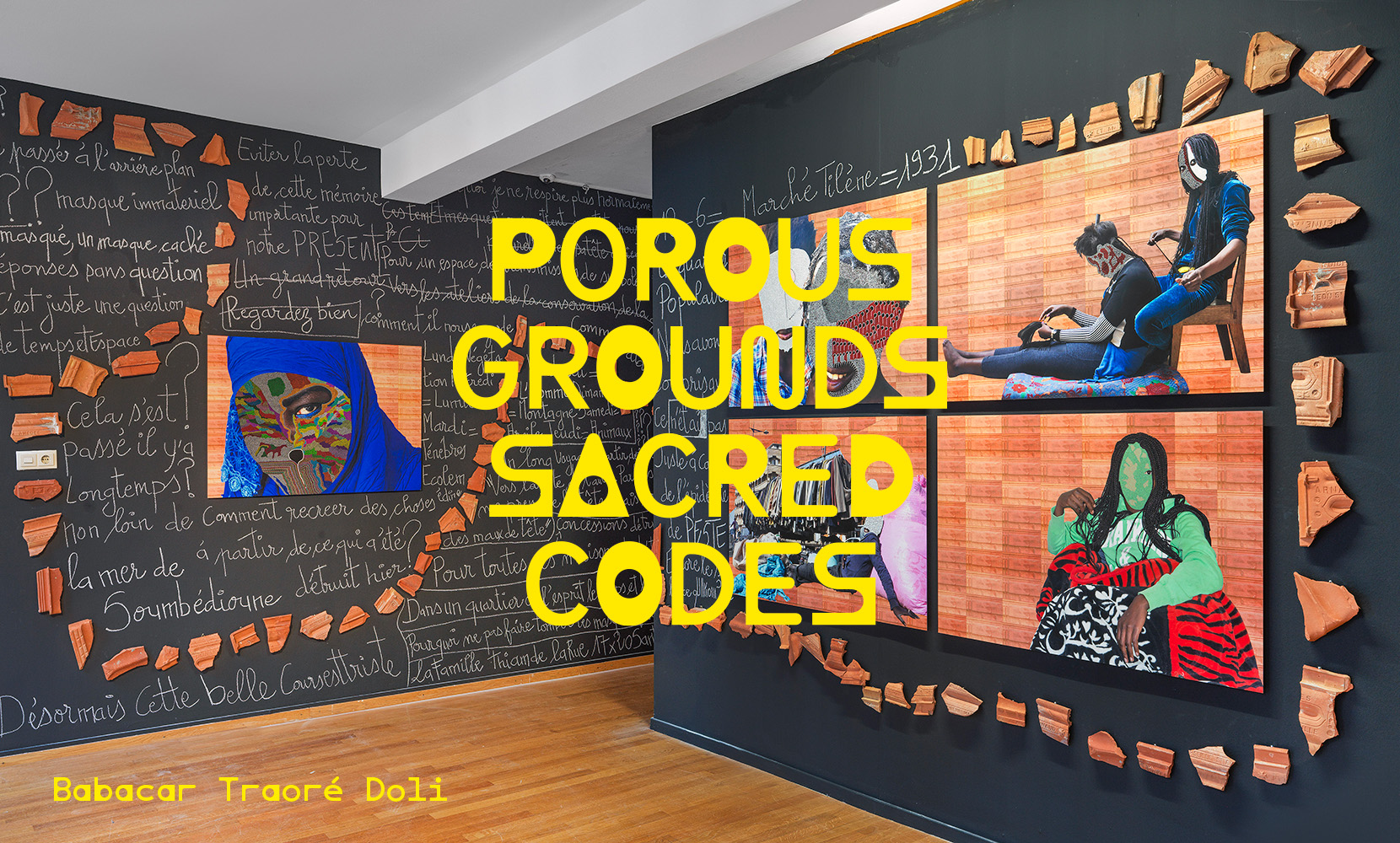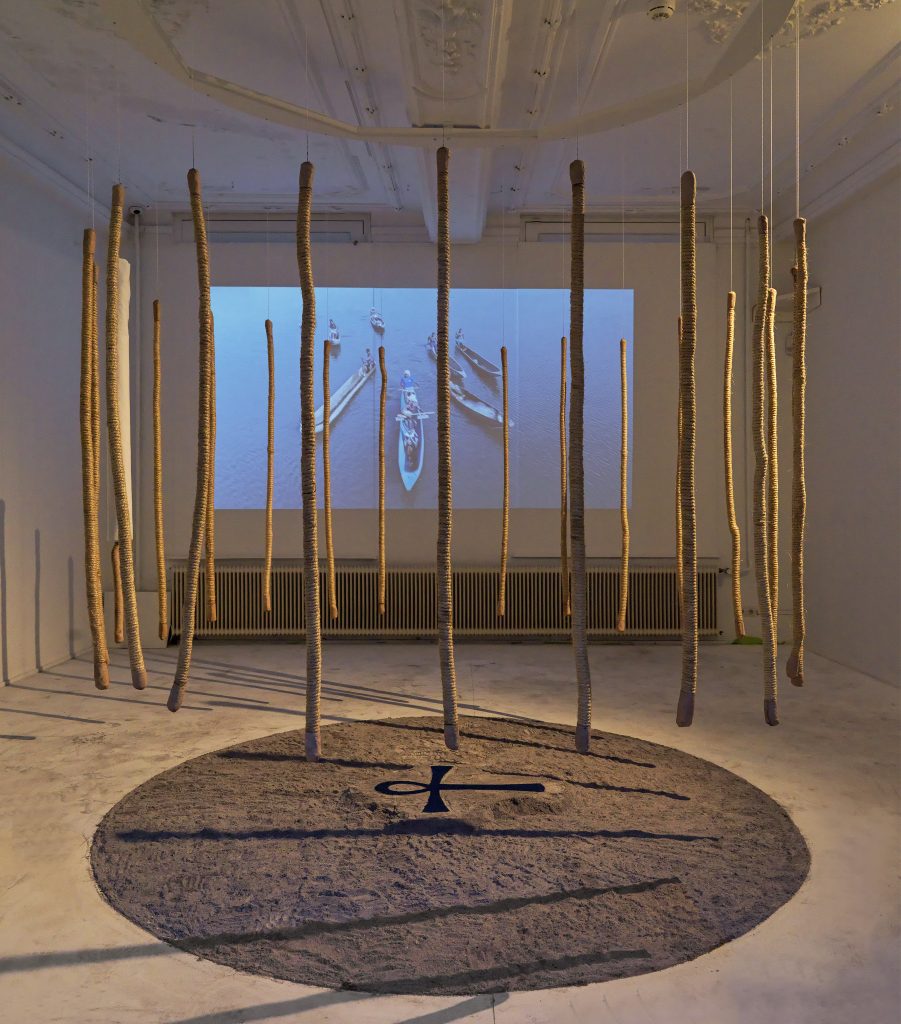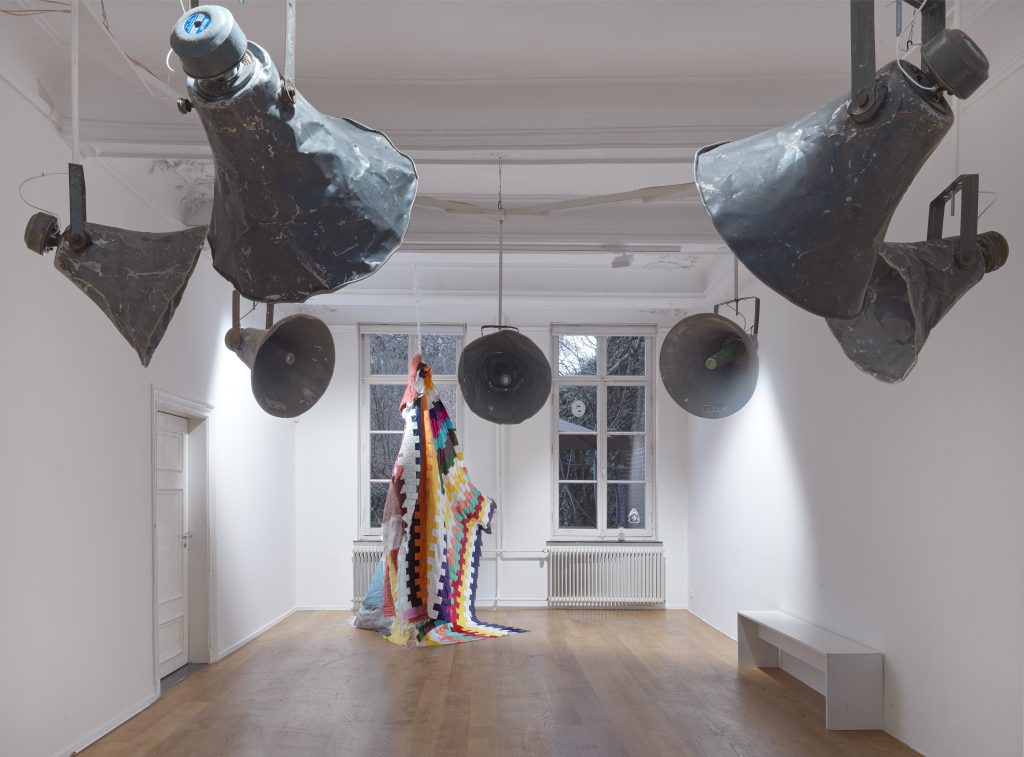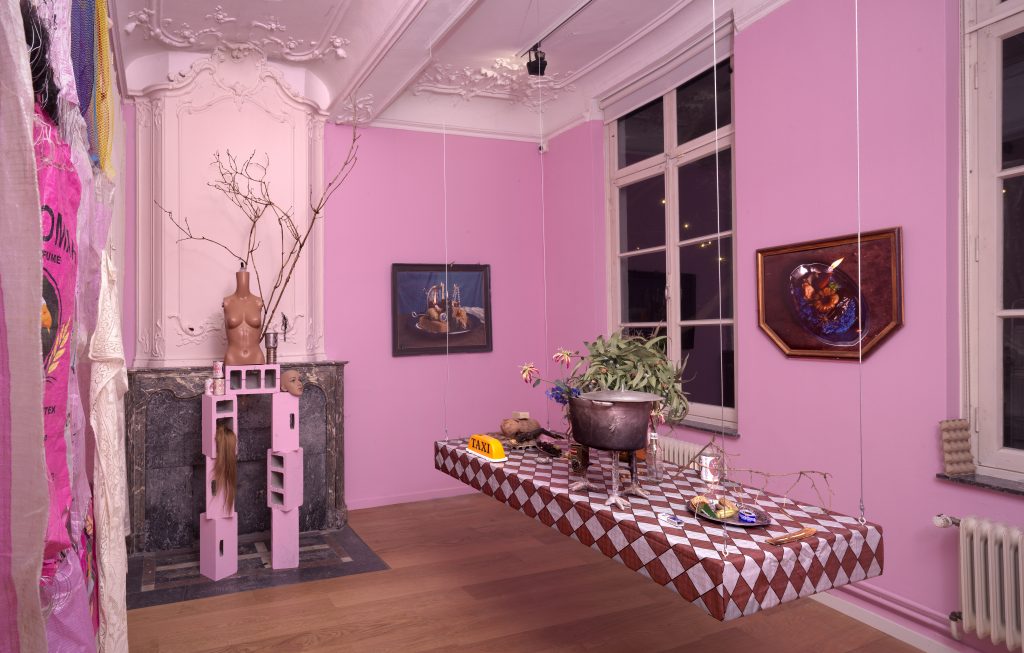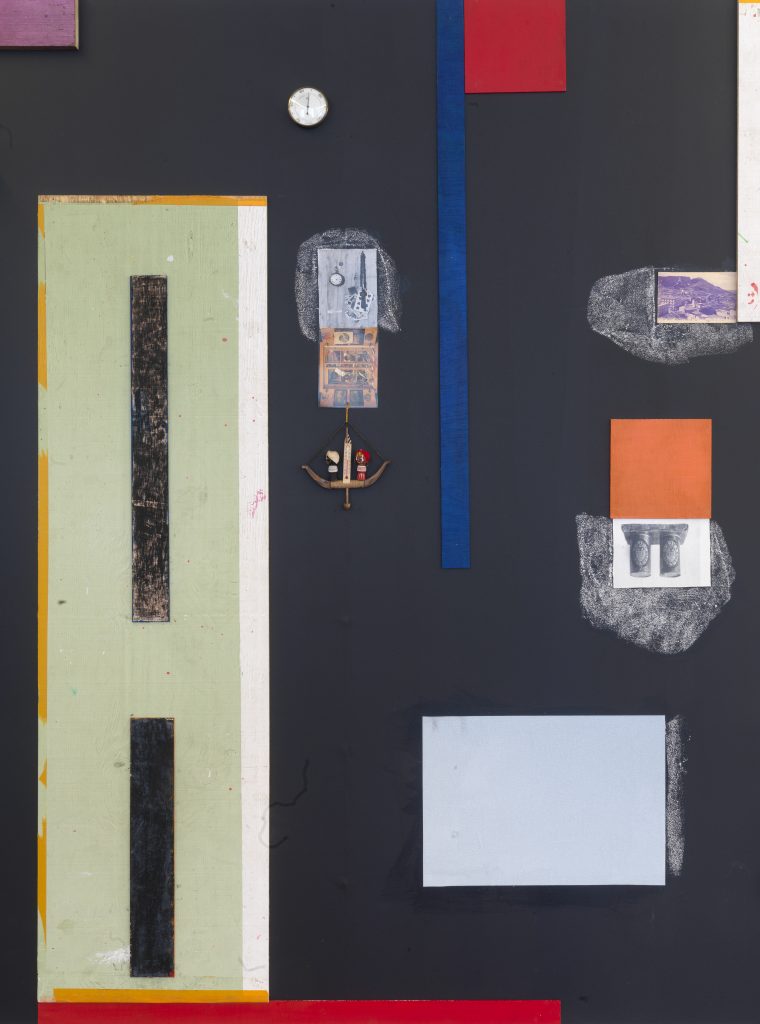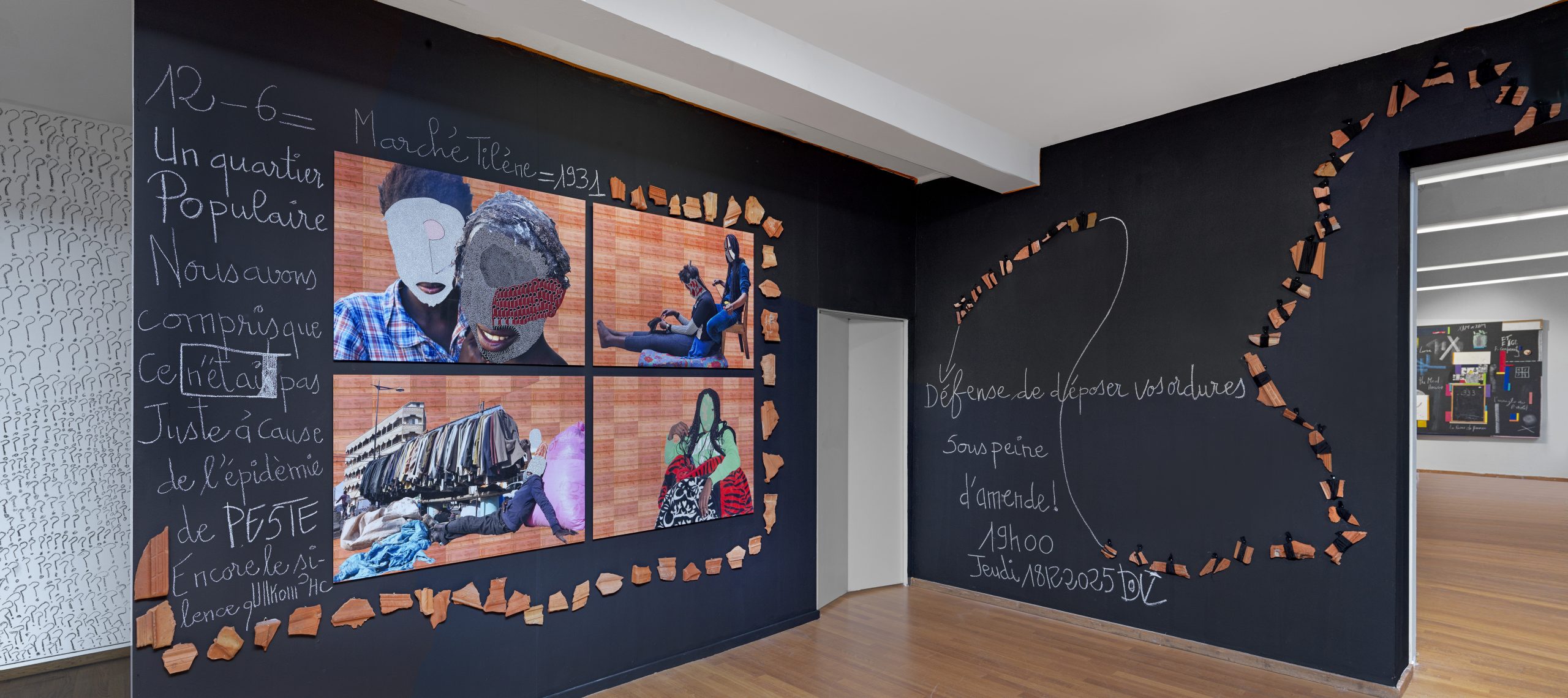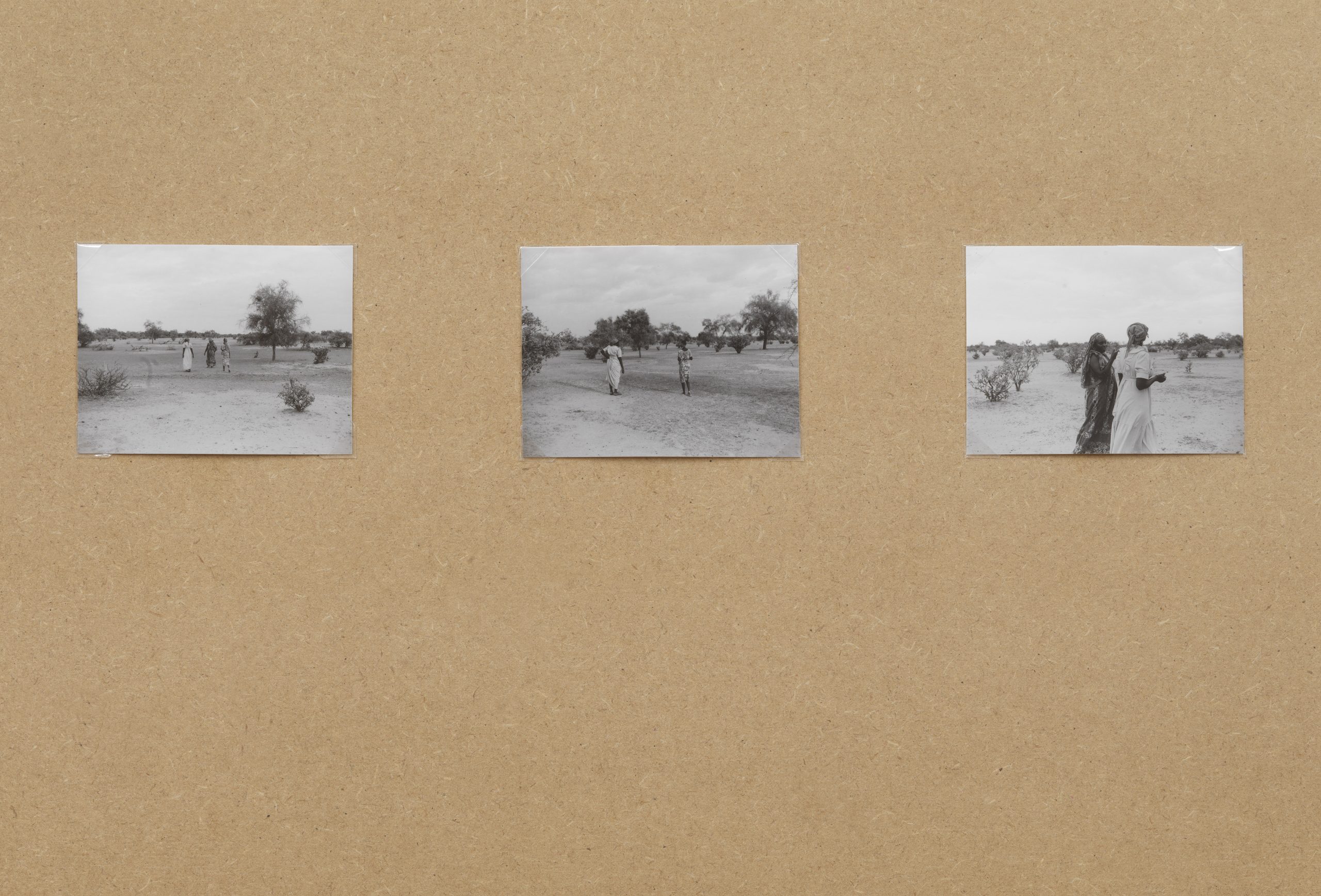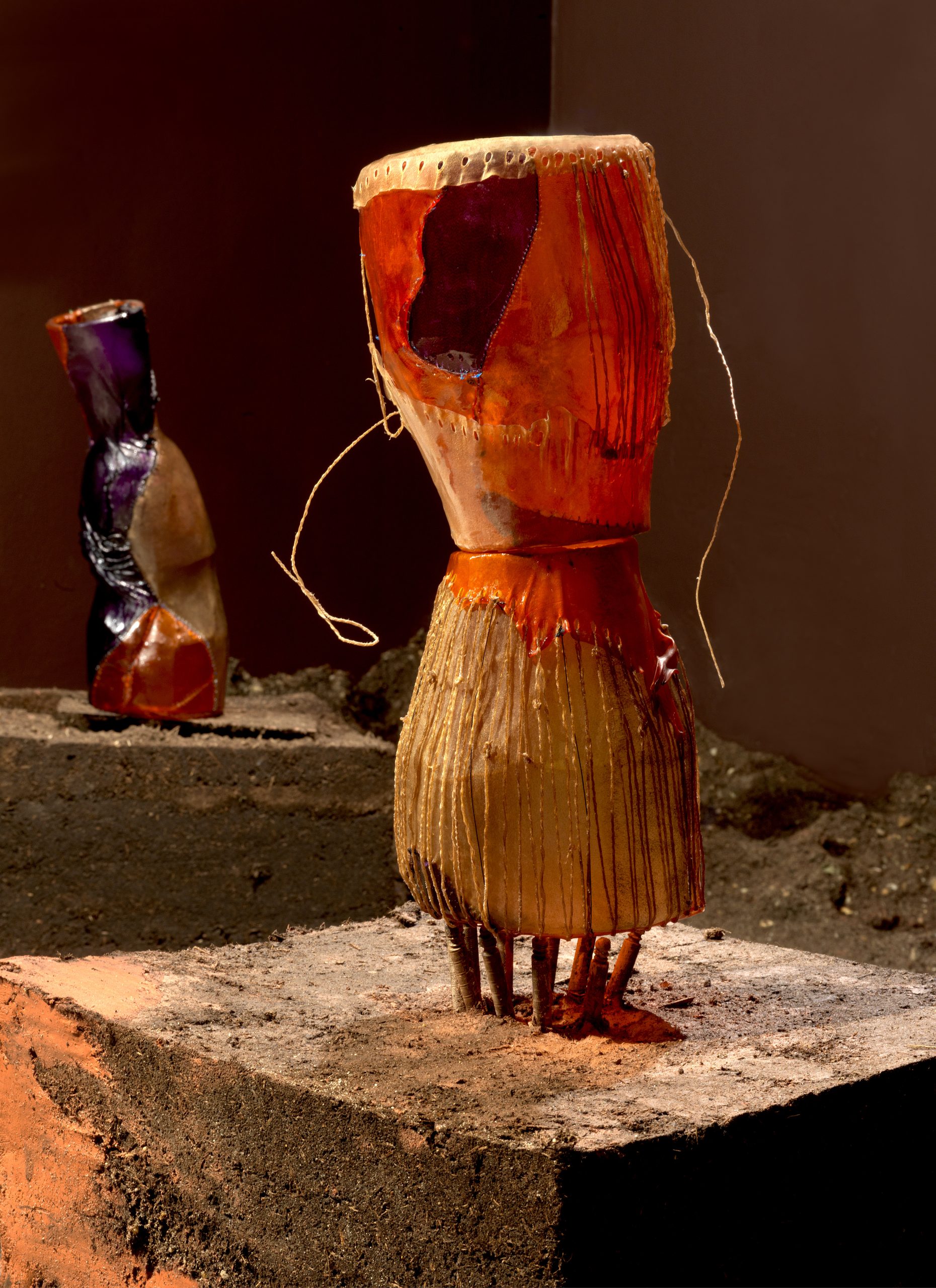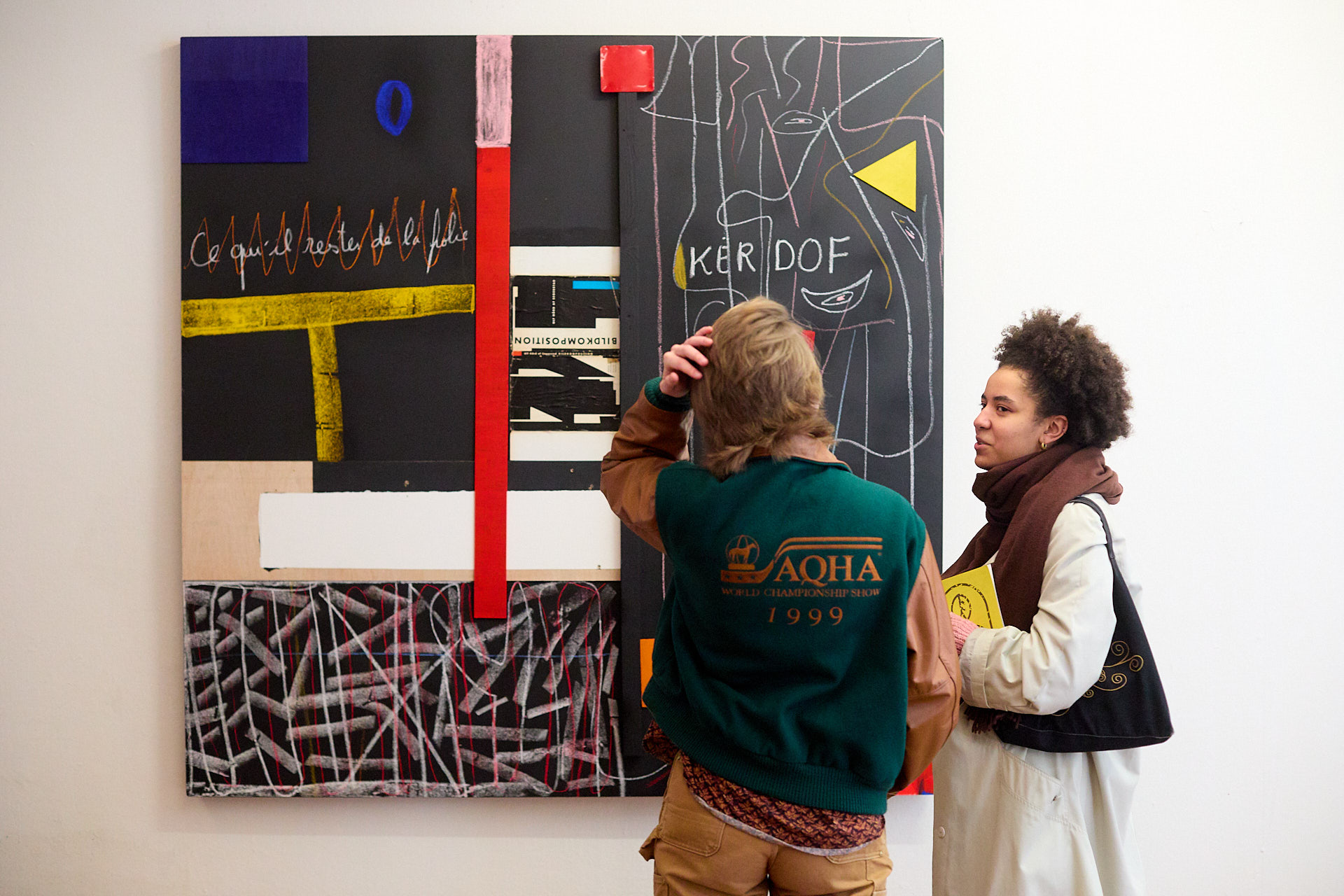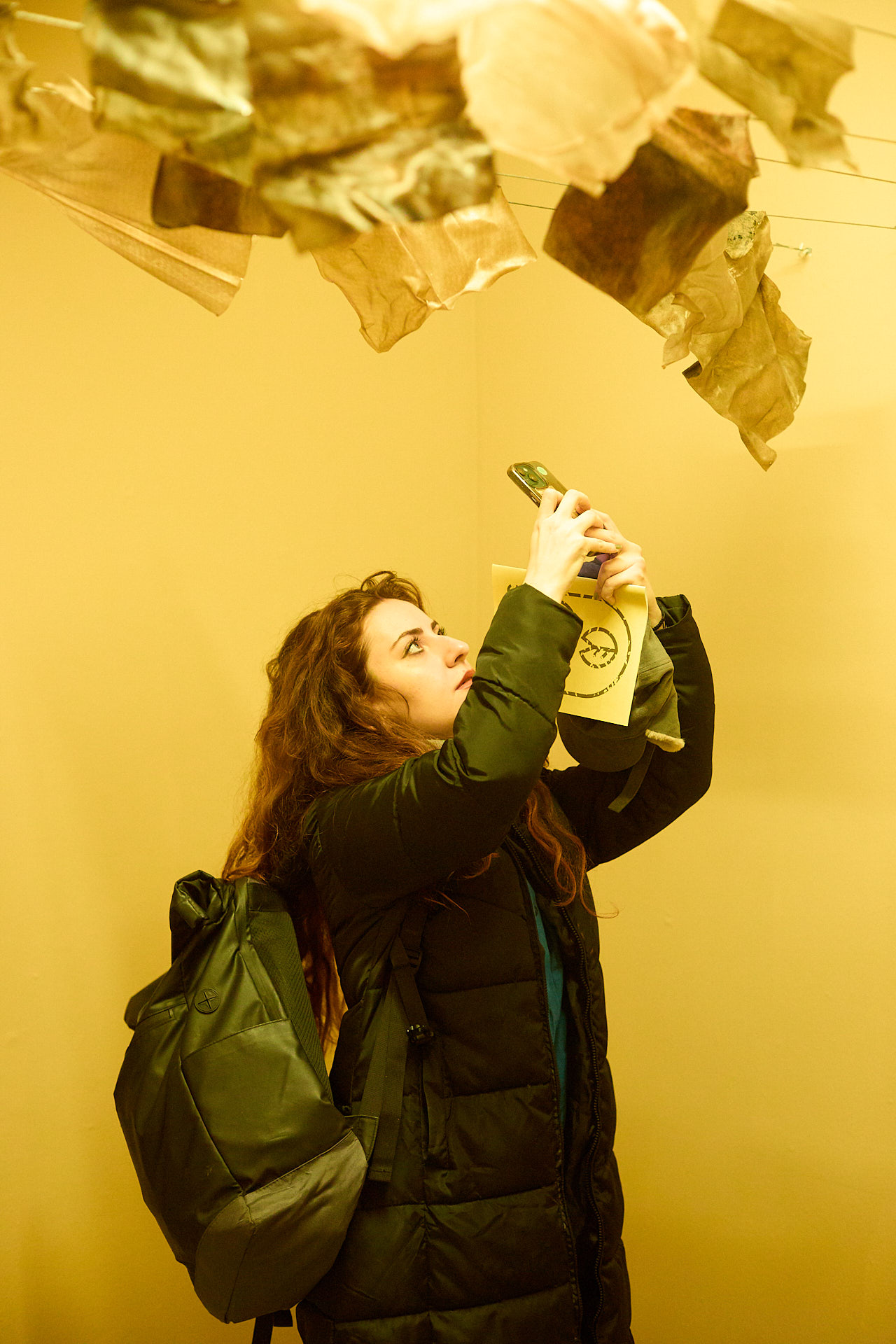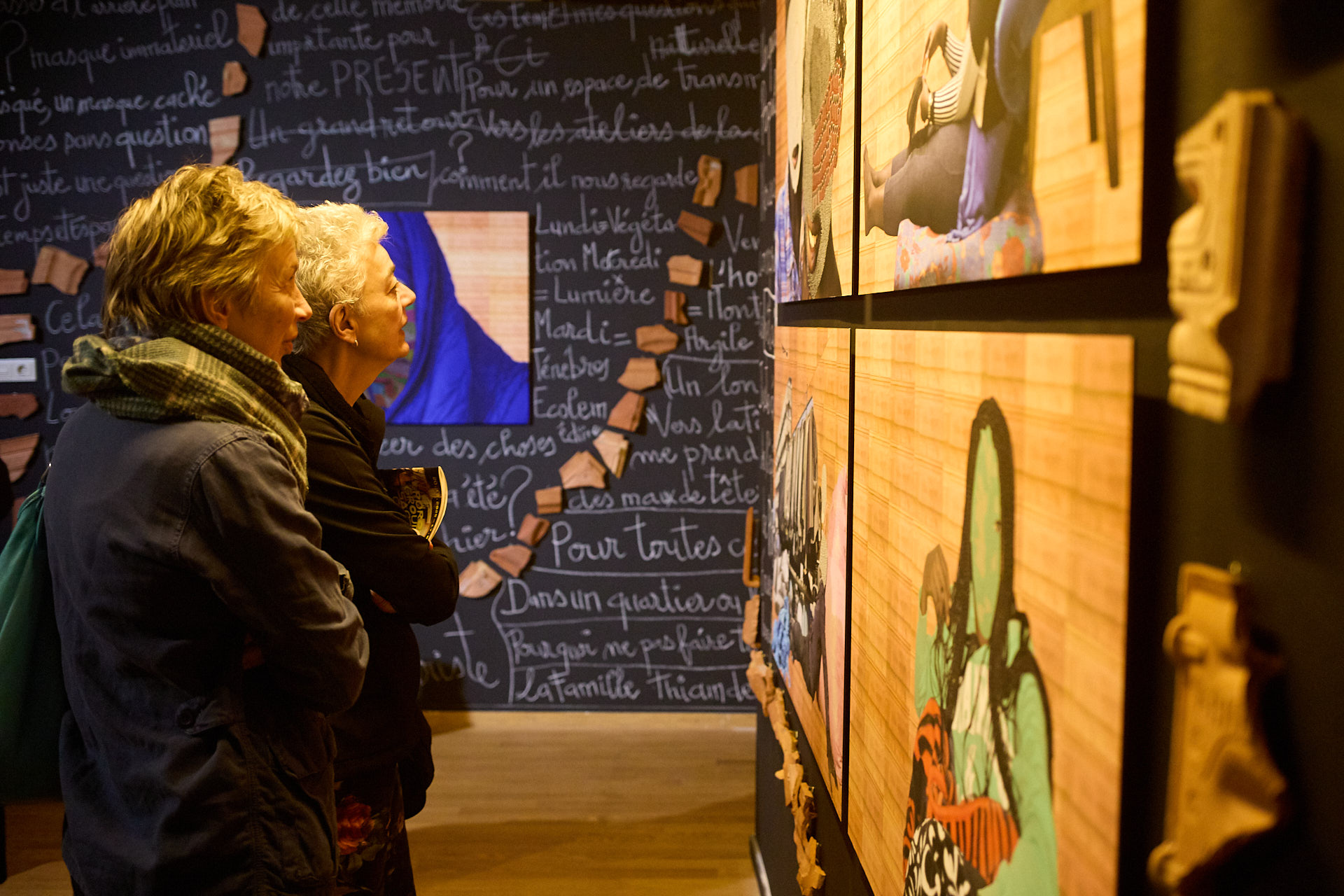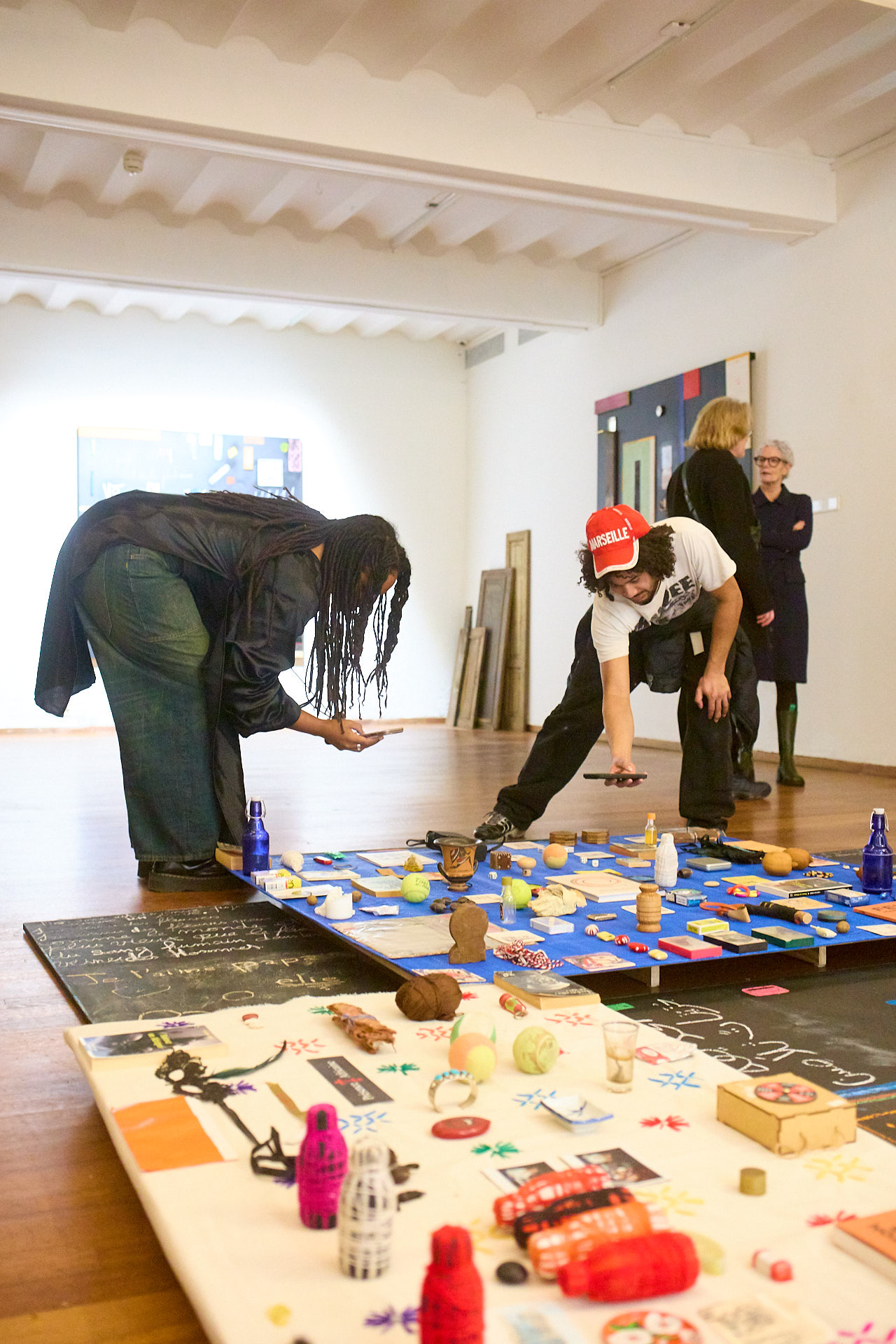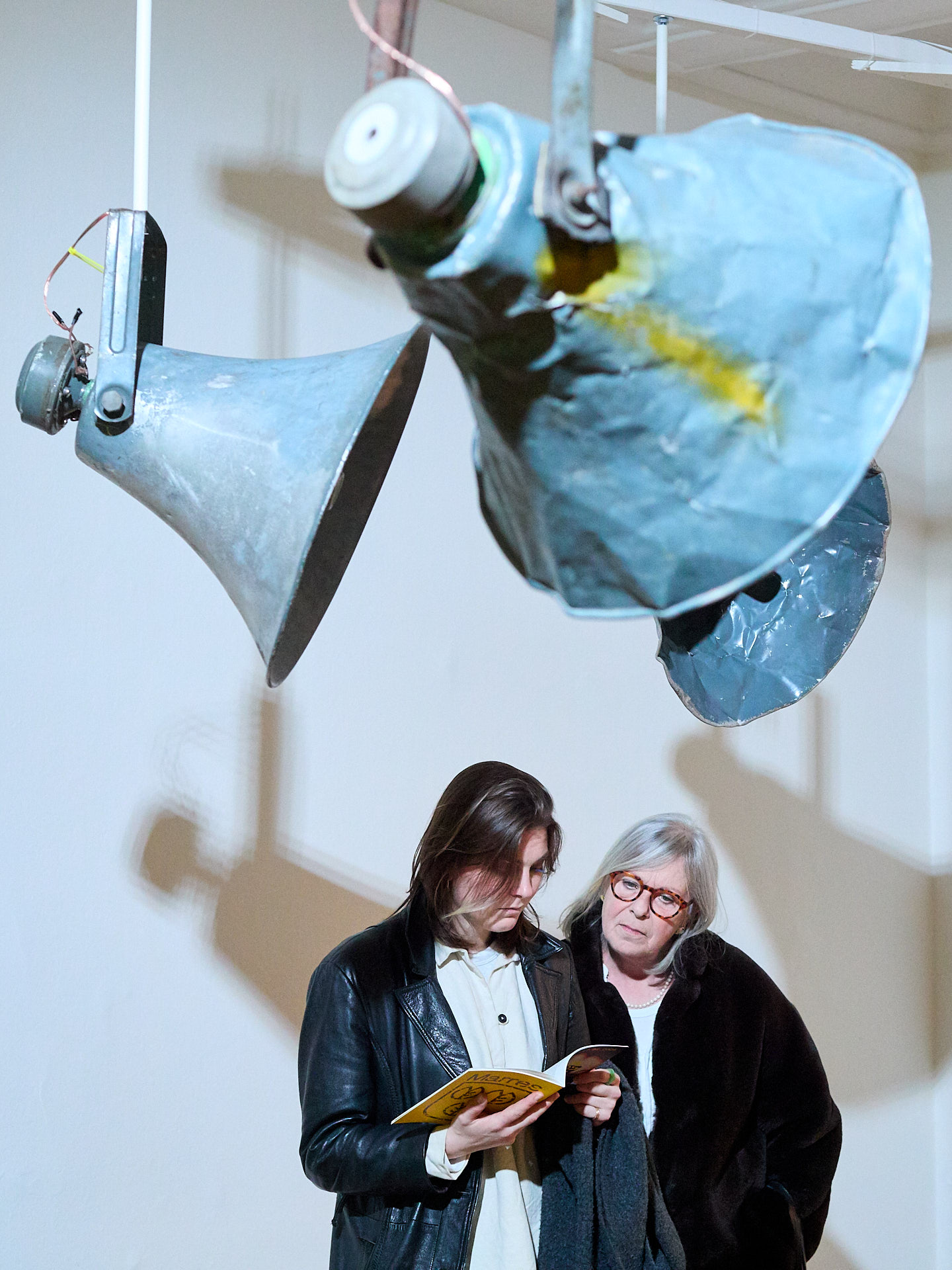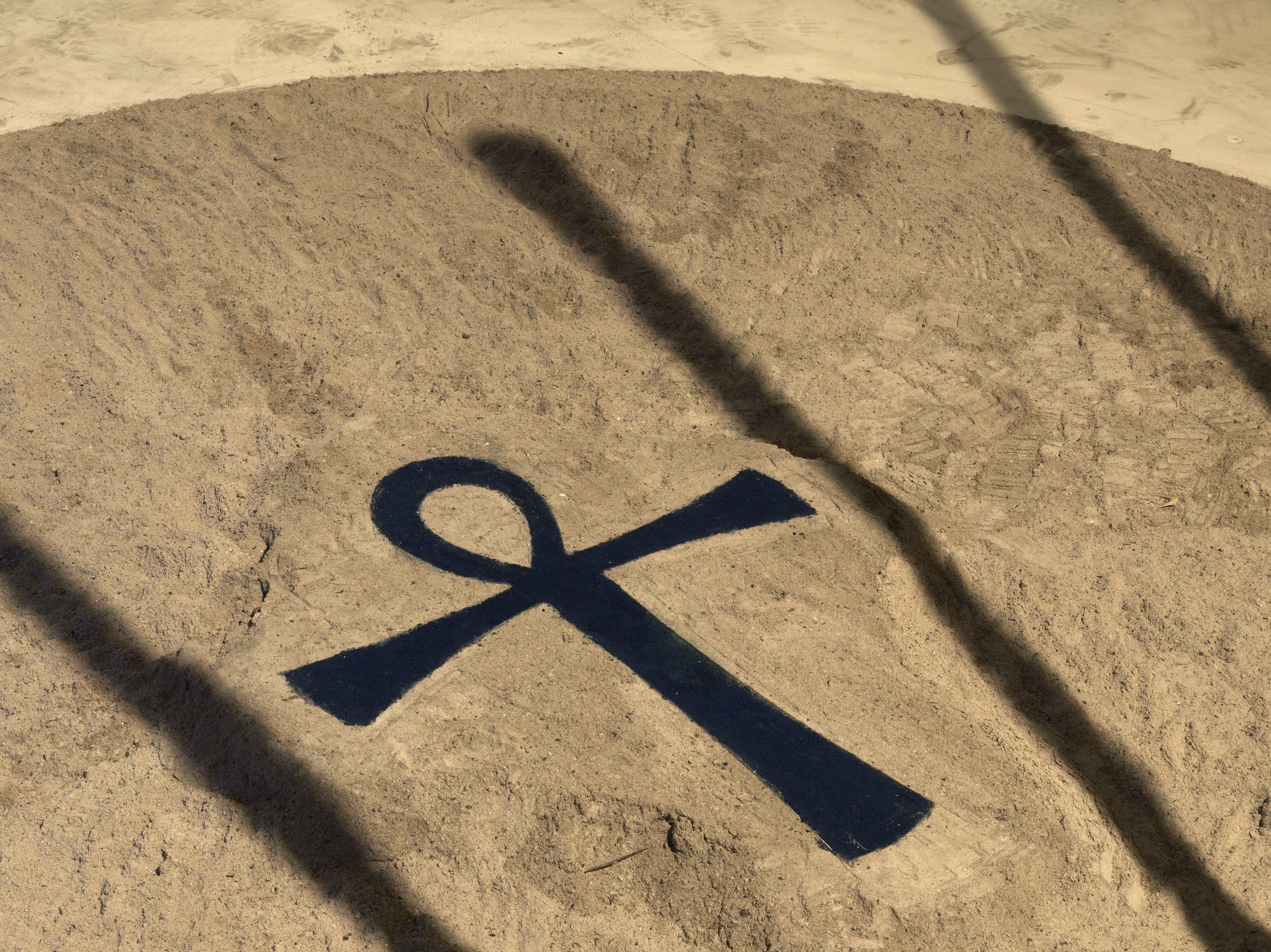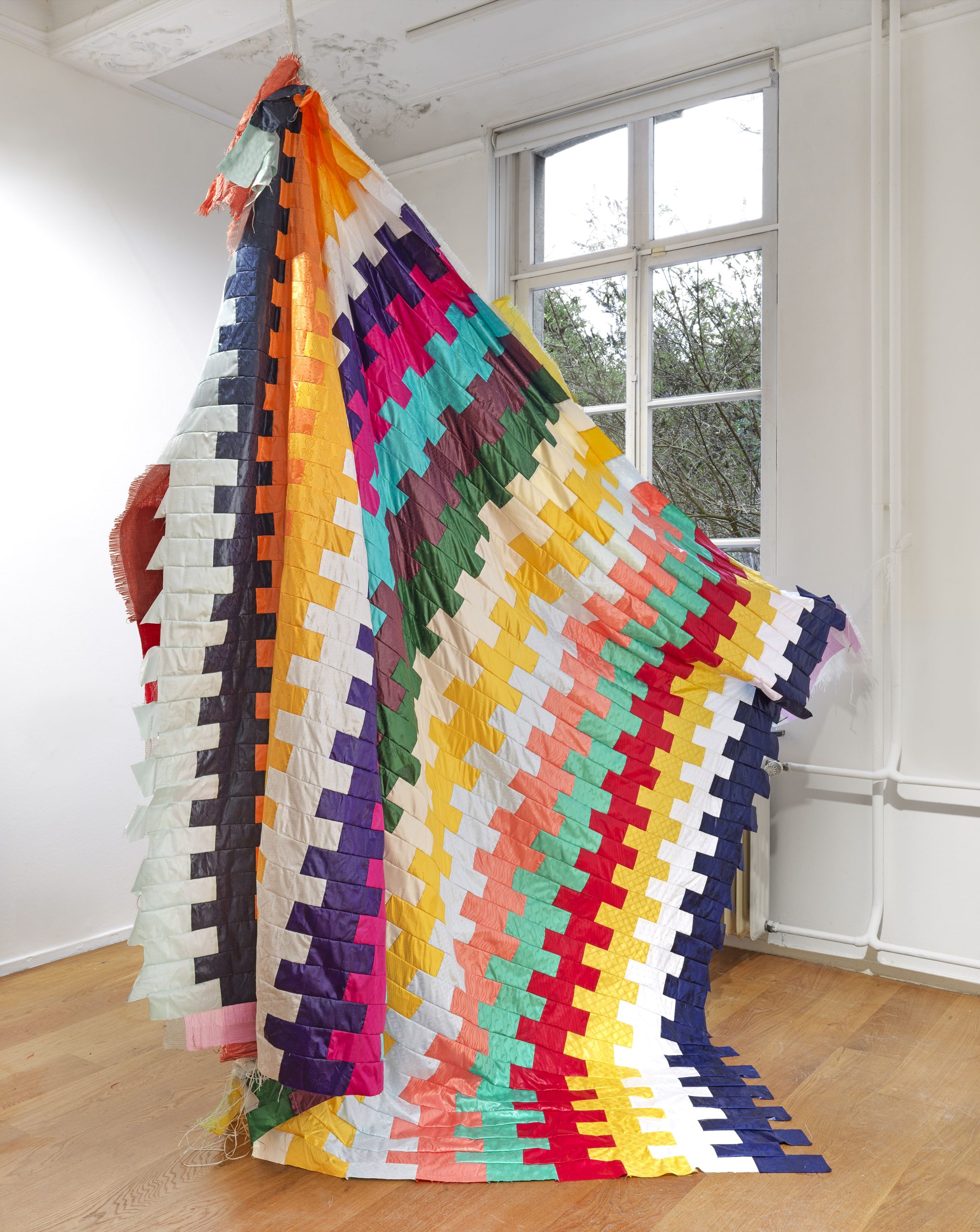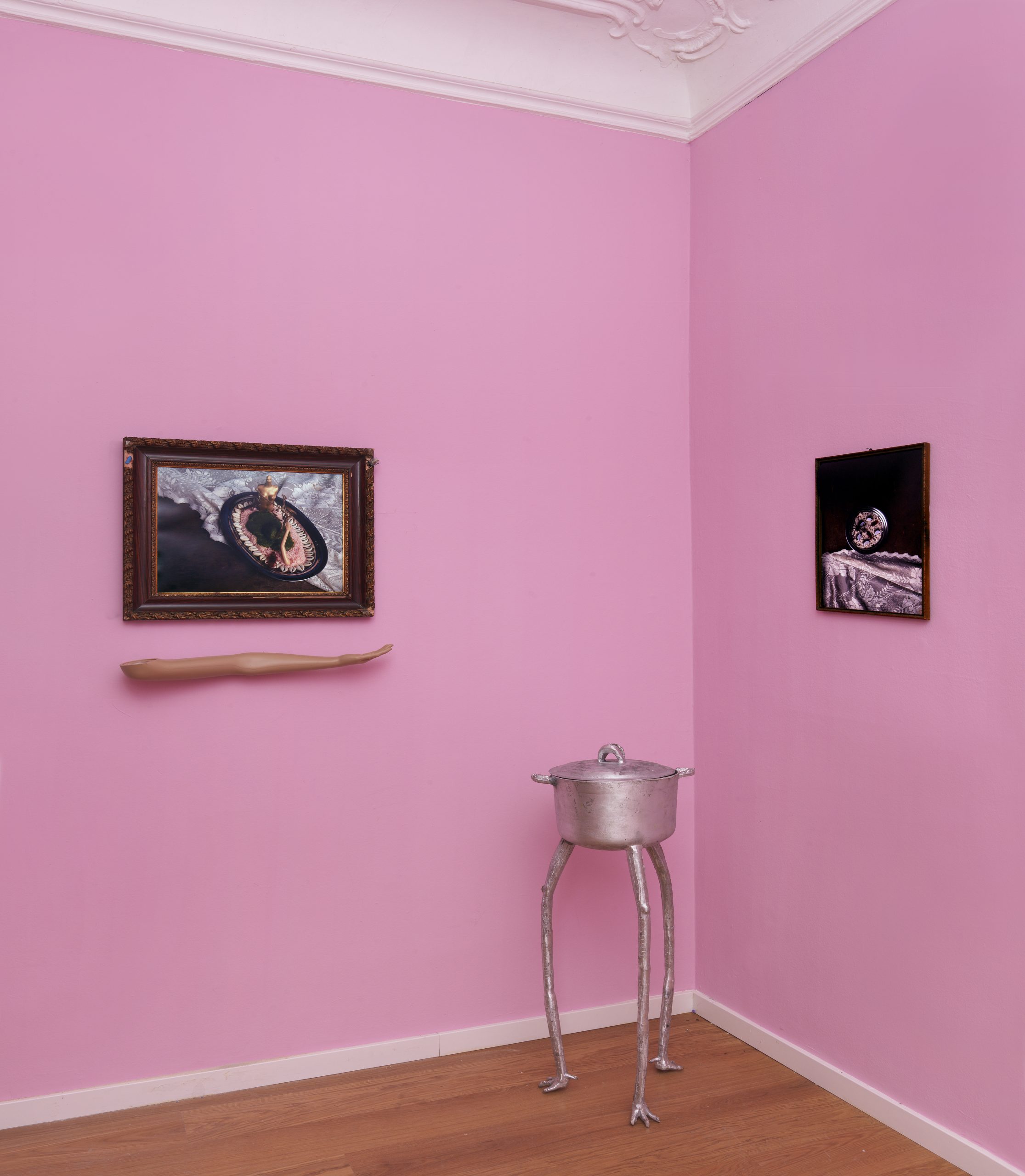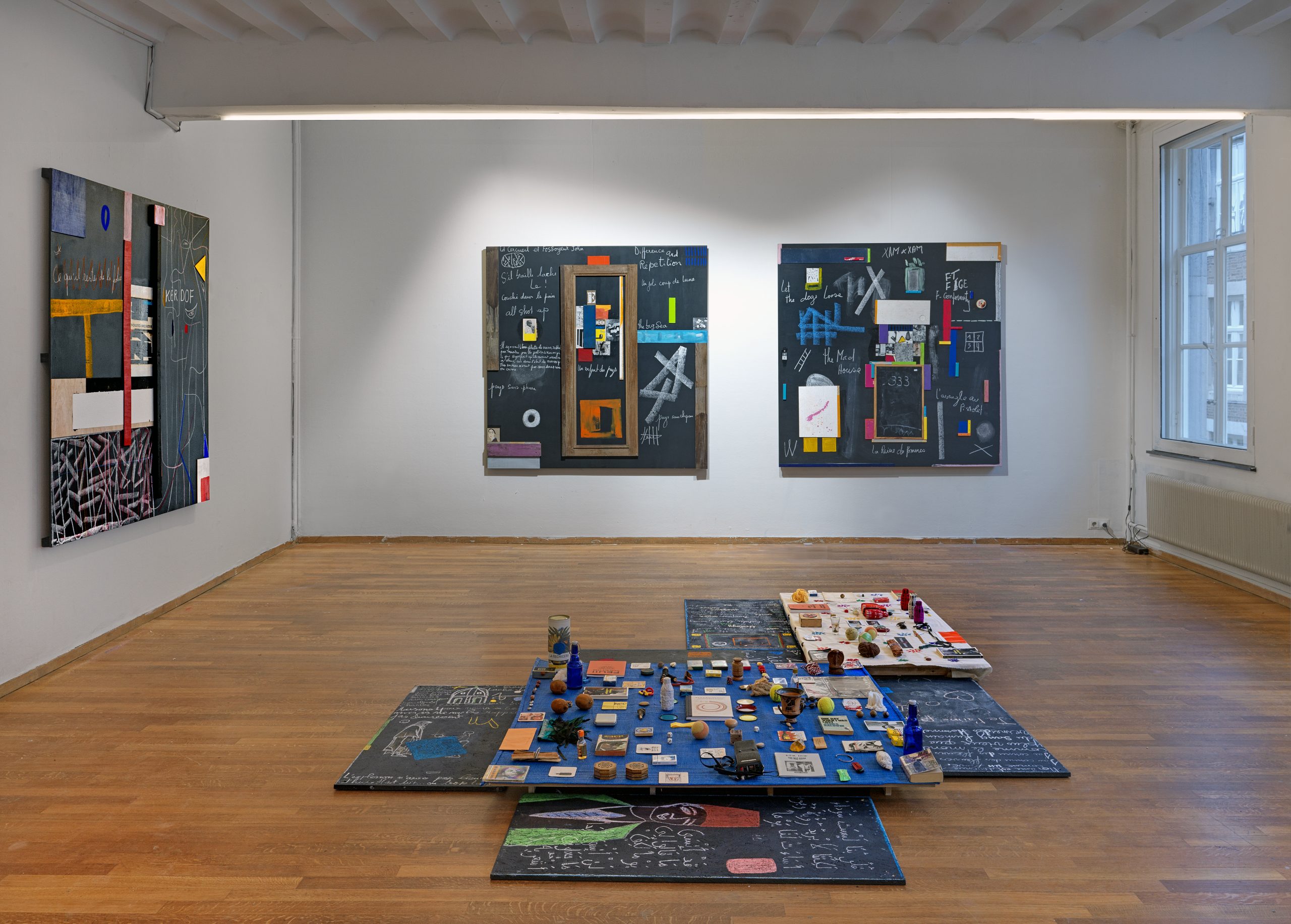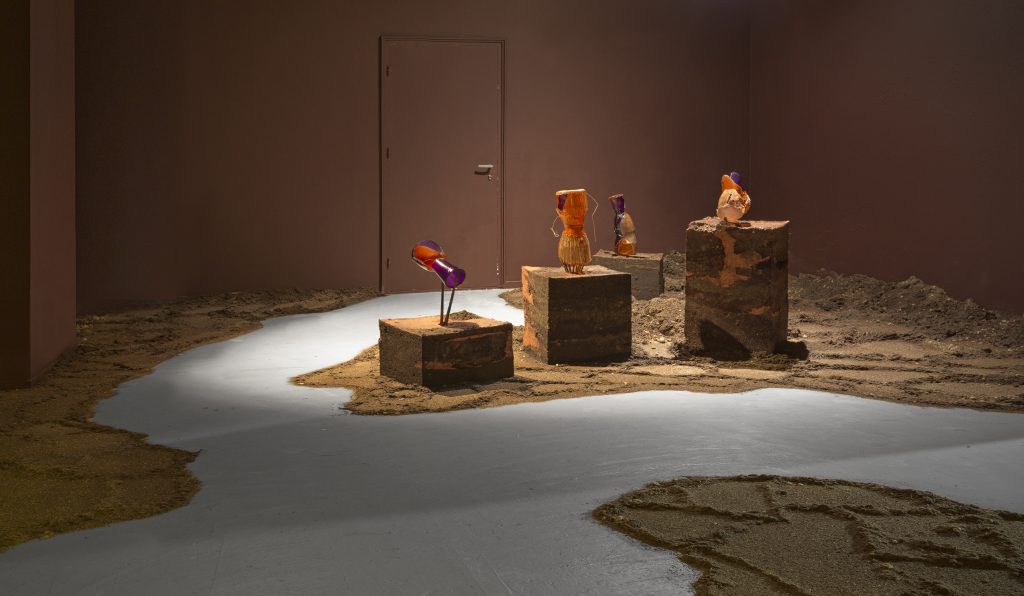Porous Grounds, Sacred Codes is a large-scale exhibition project that takes you on a powerful and inspiring journey through themes of collectivity, diaspora, and cultural identity.
Collective process
Seven artists with roots in West Africa—Yacine Tilala Fall, Selly Raby Kane, Maguette Dieng, Ican Ramageli, Hamedine Kane, Eva Diallo, and Babacar Traoré “Doli”—are jointly creating a multi-sensory total installation incorporating sculpture, sound, textiles, video, and performance. While each artist maintains their unique signature, the extraordinary collective process of creation is central. The exhibition seeks to explore what it means to build an artistic universe together, in which every background and perspective is given space.
RAW Material Company
Porous Grounds, Sacred Codes is being developed in close collaboration with the renowned Senegalese art institute RAW Material Company (Dakar). From their team, two curators have been appointed: Haja Fanta and Filly Gueye. In addition, RAW is organizing the preparatory online residency program and contributing to a thought-provoking public program filled with experts and in-depth conversations.
Right to Opacity
Inspired by the thinking of Anne Dufourmantelle and Édouard Glissant, the exhibition also explores the codes that remain hidden and the “right to opacity.” Nurturing the quiet grounds of culture supports the preservation of identity, while also serving as an act of respect and a source of intimacy.
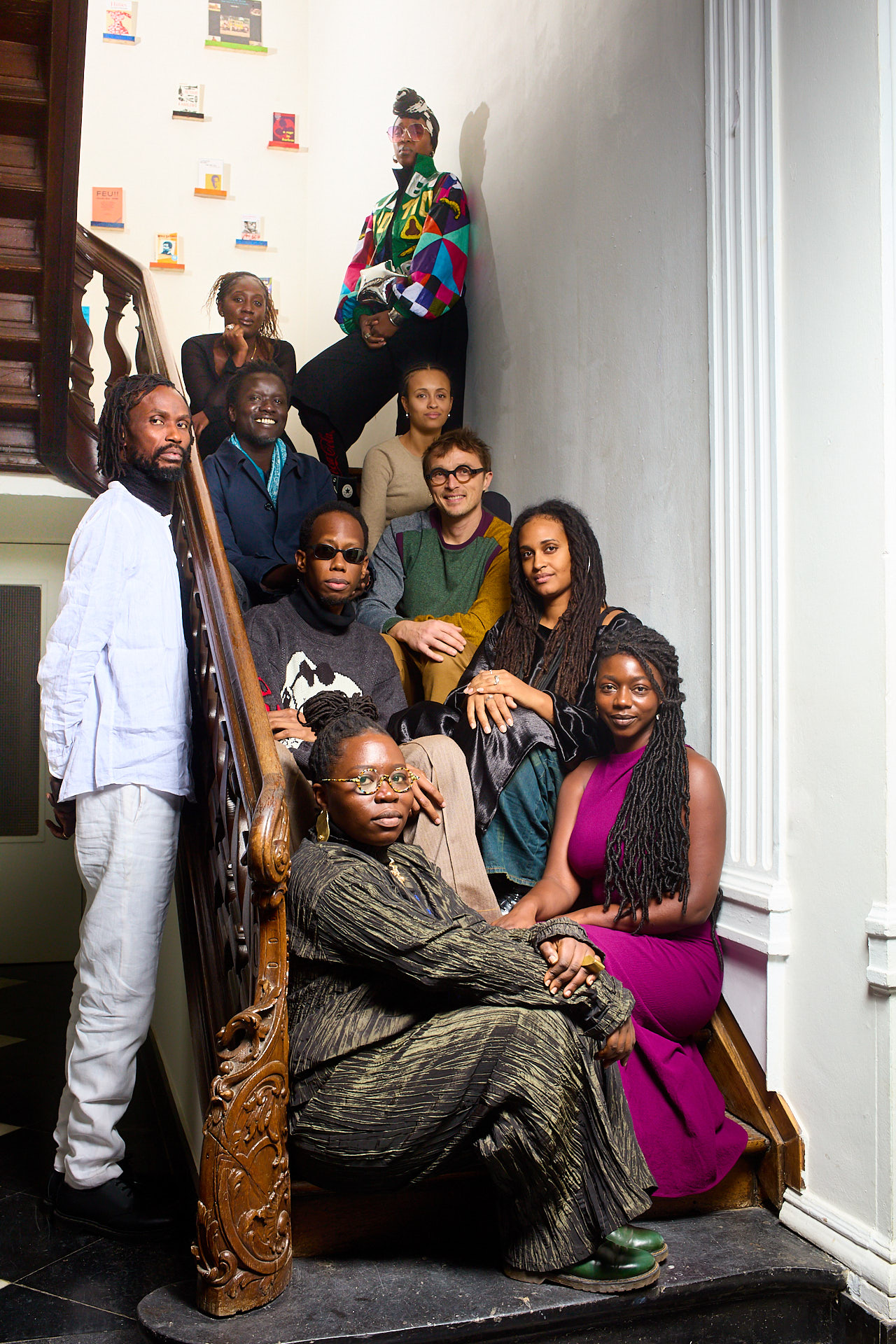
Photo: Rob van Hoorn

Public winter program: Free Friday Evenings
Alongside the exhibition, the project presents an extensive educational and public program addressing themes such as heritage, cultural identity, migration, and the power of sensory experience. The program includes multilingual guided tours, film screenings in collaboration with arthouse cinema Lumière, workshops on West African traditions and music with DAR Cultural Agency, storytelling evenings, podcasts, and conversations with international experts.
Artists
EN – Yacine Tilala Fall (Washington D.C., 1997) is a conceptual artist whose work engages animism as both a material philosophy and a tool for destabilizing Western ideas of value, time, and language. Drawing on her Senegalese heritage and the country’s ethnomedicinal traditions, Fall explores cultural identity, lineage, and intimacy through clay, metal, organic tissue, and fiber. Her performance installations and sculptures create ensembles of vessels, sites, and systems that trace the relationship between the corporeal and the unknown.
FR – Yacine Tilala Fall (Washington, D.C., 1997) est une artiste conceptuelle qui engage l’animisme comme philosophie matérielle autant que comme outil critique, capable d’ébranler les catégories occidentales de la valeur, du temps et du langage. Puisant dans son héritage sénégalais et dans les traditions ethnomédicinales du pays, Fall explore l’identité culturelle, la filiation et l’intimité à par l’argile, le métal, les tissus organiques et la fibre. Ses installations performées et ses sculptures composent des ensembles (vases, sites, systèmes) qui tracent la relation mouvante entre le corporel et l’inconnu.
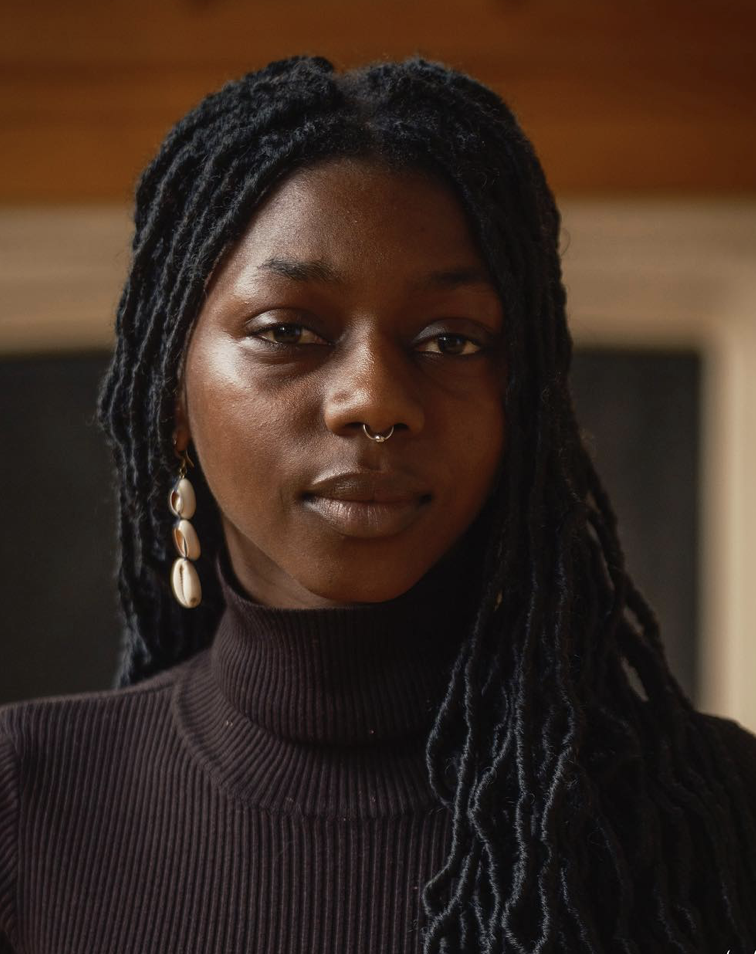
EN – Selly Raby Kane (Dakar, 1986) is a Senegalese multidisciplinary artist working across fashion, film, digital art, virtual reality, and photography. She launched her fashion line in 2012, grounding her practice in surrealism and avant-garde aesthetics. In 2014, she staged Alien Cartoon, a groundbreaking fashion performance envisioning Dakar’s future, which also inspired an album of the same name by the music artist Ibaaku. The following year, she directed The Other Dakar, a pioneering VR film revisiting Senegalese mythology. More recent projects include the film TANG JËR (2020), in which an eclectic community reflects on life in a Dakar street restaurant, Jant Yi (2021), a short film on extractivism and its impact on Senegalese rituals, and Penda Mbaye (2024), a photo series that transforms traditional dishes into surreal compositions. Kane’s work has been presented internationally, including at MoMA PS1 and the Guggenheim Museum.
FR – Selly Raby Kane (Dakar, 1986) est une artiste sénégalaise pluridisciplinaire qui pratique la mode, le cinéma, l’art numérique, la réalité virtuelle et la photographie. Elle lance sa ligne de mode en 2012, affirmant un imaginaire nourri de surréalisme et d’esthétiques de l’ailleurs. En 2014, elle présente « Alien Cartoon », undéfilé-performance innovant, qui imagine le futur de Dakar et inspire même un album éponyme de l’artiste Ibaaku. L’année suivante, elle réalise « The Other Dakar », film pionnier en réalité virtuelle qui revisite la mythologie sénégalaise. Parmi ses projets récents, citons le film « TANG JËR » (2020), où une communauté éclectique médite sur la vie autour d’un restaurant de rue à Dakar, « Jant Yi » (2021), court métrage sur l’extractivisme et ses retentissements sur les rituels sénégalais, ou encore « Penda Mbaye » (2024), série photographique qui transforme les plats traditionnels en compositions surréalistes. Son travail a été présenté à l’international, notamment au MoMA PS1 et au Guggenheim Museum.
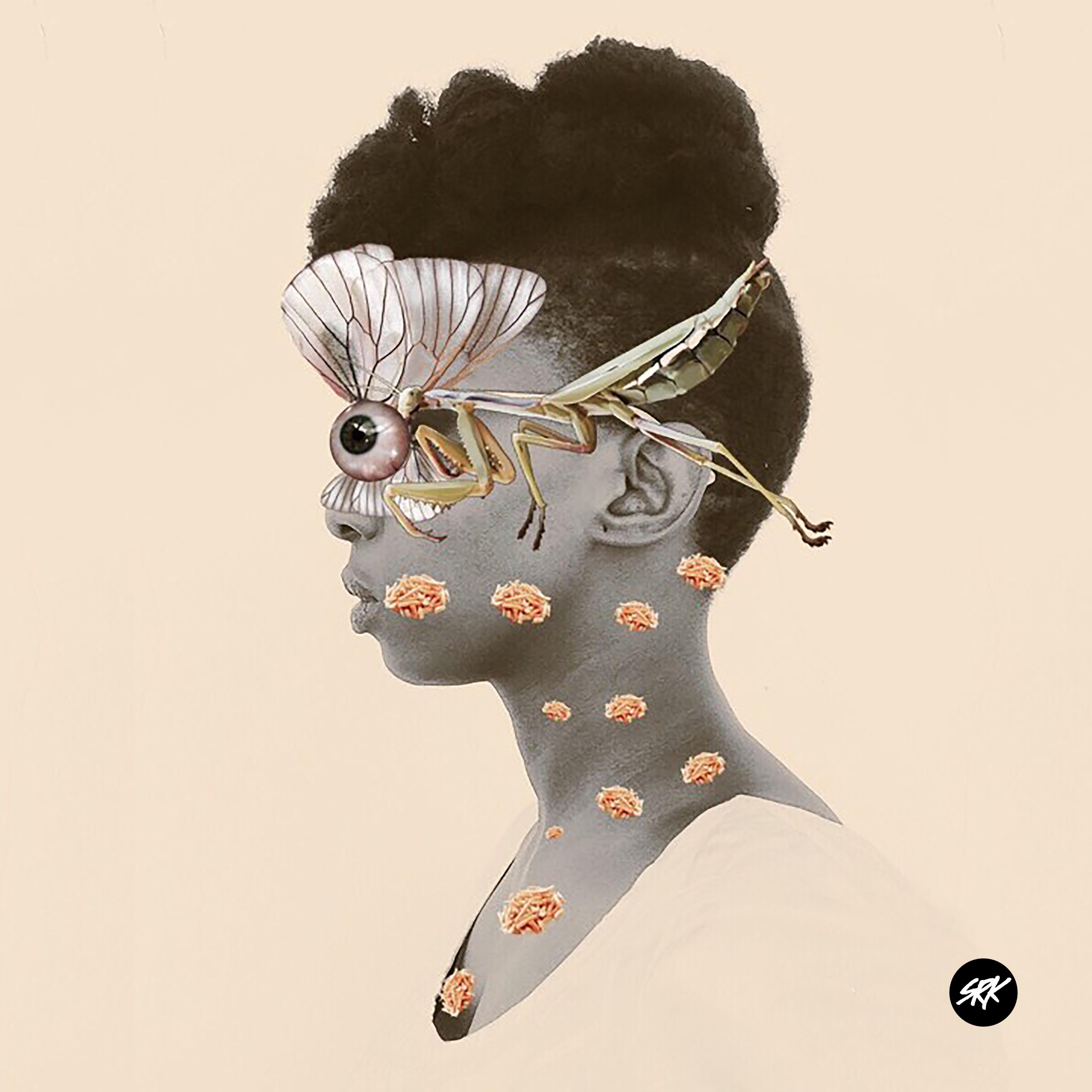
EN – Maguette Dieng (Barcelona, 1988) is a DJ, producer, educator, music programmer and dedicated explorer of music and sound. She is the co-founder of the Jokkoo Collective, with which she has presented audiovisual and sound works at festivals such as Atonal (Berlin), Norient (Basel), and Manifesta (Barcelona). She is also part of FOC, a self-managed cultural space where she creates sonic and artistic experiences rooted in community, purpose, and healing. In her personal practice, she attempts to translate the emotions and experiences of everyday life into sound in a poetic, sensitive and critical way. For her, sound is both a tool for socio-political and personal transformation as well as a bridge between distant realities and personal memories.
FR – Maguette Dieng (Barcelone, 1988) est une DJ, productrice, pédagogue, programmatrice musicale et exploratrice engagée des territoires du son. Cofondatrice du Jokkoo Collective, elle déploie des œuvres audiovisuelles et sonores sur des scènes telles que l’Atonal (Berlin), Norient (Bâle) et Manifesta (Barcelone). Elle fait également partie de FOC, espace culturel autogéré où elle conçoit des expériences sonores et artistiques ancrées dans la communauté, la finalité et le soin. Dans sa pratique personnelle, elle tente de traduire en sons, avec poésie, sensibilité et esprit critique, les émotions et expériences du quotidien. Pour elle, le son est à la fois un outil de transformation socio-politique et personnelle, et un pont tendu entre réalités lointaines et mémoires familiales.
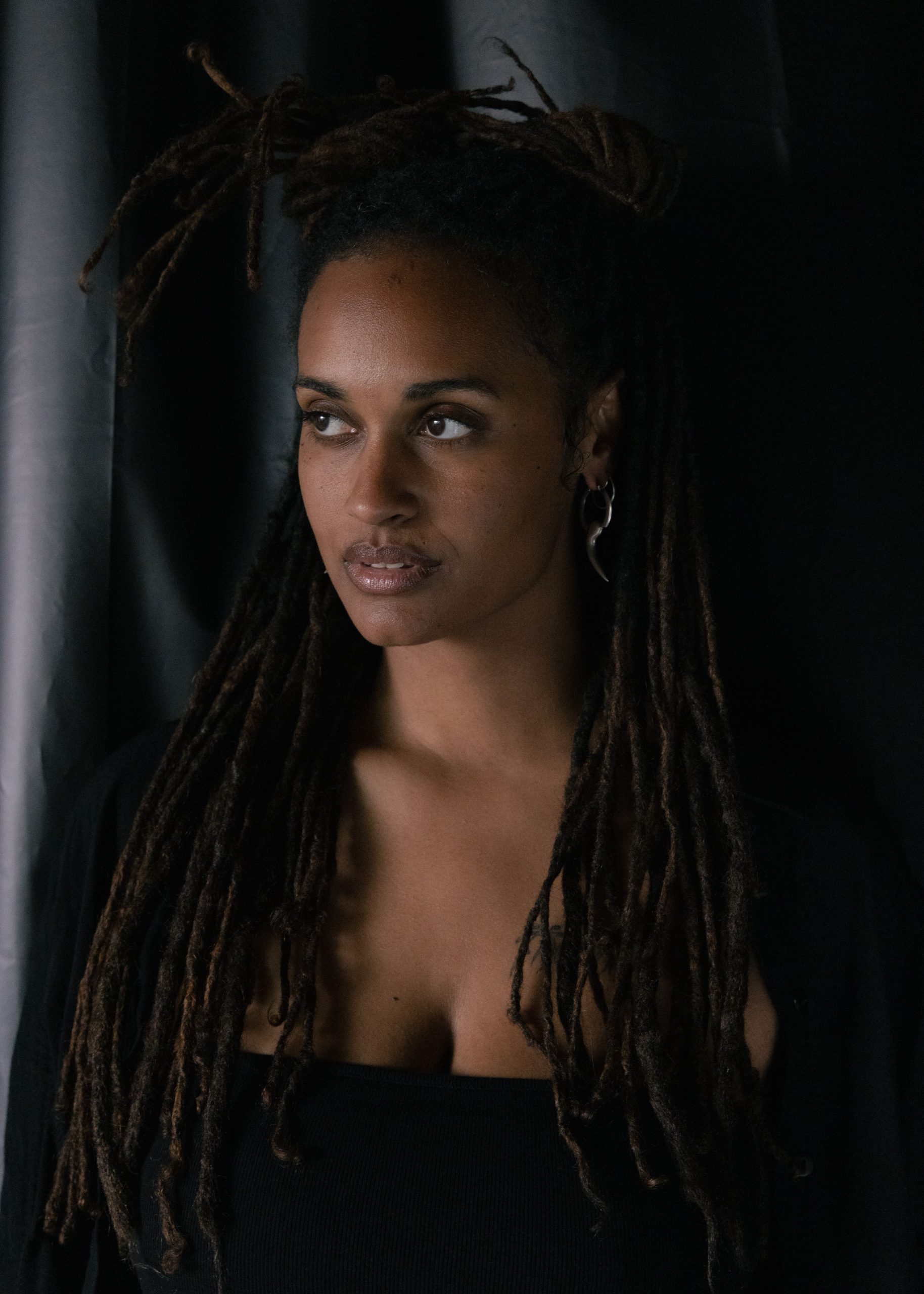
EN – Ican Ramageli is a nomadic artist who works with video, photography, performance, painting, and music. For him, art is inseparable from the everyday realities of life. Ramageli explores new forms of awareness and action, driven by a belief that art opens up ways to engage with the complexities of existence and the urgencies of our time, to take a stand, and to contribute to change. His practice interlaces the political with the poetic, continually reimagining our relationship to reality. As a member of the influential Laboratoire Agit’Art collective, Ramageli advocates for sharing, collaboration, and a relational “we” — expanding collective practices and affirming the importance of interdependence and mutual support.
FR – Ican Ramageli est un artiste nomade qui pratique la vidéo, la photographie, la performance, la peinture et la musique. Pour lui, l’art est une manière d’être au monde, indissociable des réalités du quotidien. Explorant de nouvelles formes d’attention et d’action, Ramageli conçoit l’art comme une praxis permettant d’affronter la complexité de l’existence et l’urgence de notre époque, pour prendre position et contribuer au changement. Sa démarche, où le politique et le poétique se répondent, cherche à réinventer notre rapport au réel. Membre du collectif influent Laboratoire Agit’Art, il défend le partage, la collaboration et un « nous » relationnel qui élargit les pratiques collectives, soutenant l’importance de l’interdépendance et de l’entraide.
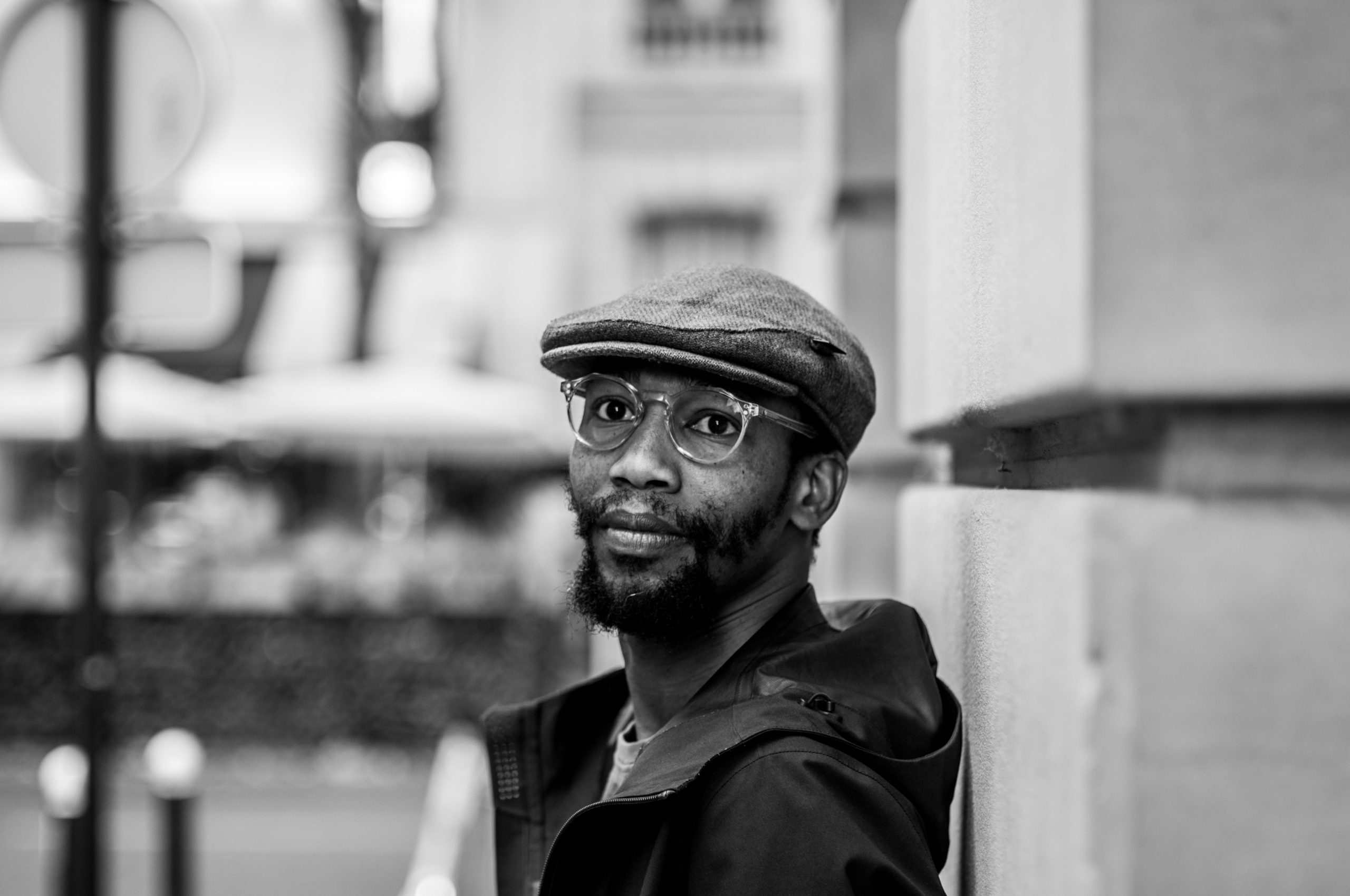
EN – Hamedine Kane (Nouakchott, Mauritania, 1983) is a Senegalese-Mauritanian multidisciplinary artist. Trained as a librarian, he first traveled to Europe in 2004 with a grant to study the book trade in Paris. Soon after, he settled in Brussels, where his artistic practice grew out of his own experience of migration. Working with film, photography, installation, performance, drawing, and engraving, Kane views borders not as barriers or limits but as thresholds — as spaces of passage and transformation.
FR – Hamedine Kane (Nouakchott, Mauritanie, 1983) est un artiste sénégalo-mauritanien aux pratiques multiples. Bibliothécaire de formation, il effectue son premier voyage vers l’Europe en 2004, grâce à une bourse obtenue pour étudier les métiers du livre à Paris. La même année, il s’installe à Bruxelles et s’inspire de sa propre expérience de la migration pour créer. Pratiquant le cinéma, la photographie, l’installation, la performance, le dessin et la gravure, Kane considère les frontières non comme des barrières ni des limites, mais comme des seuils : des espaces de passage et de transformation.
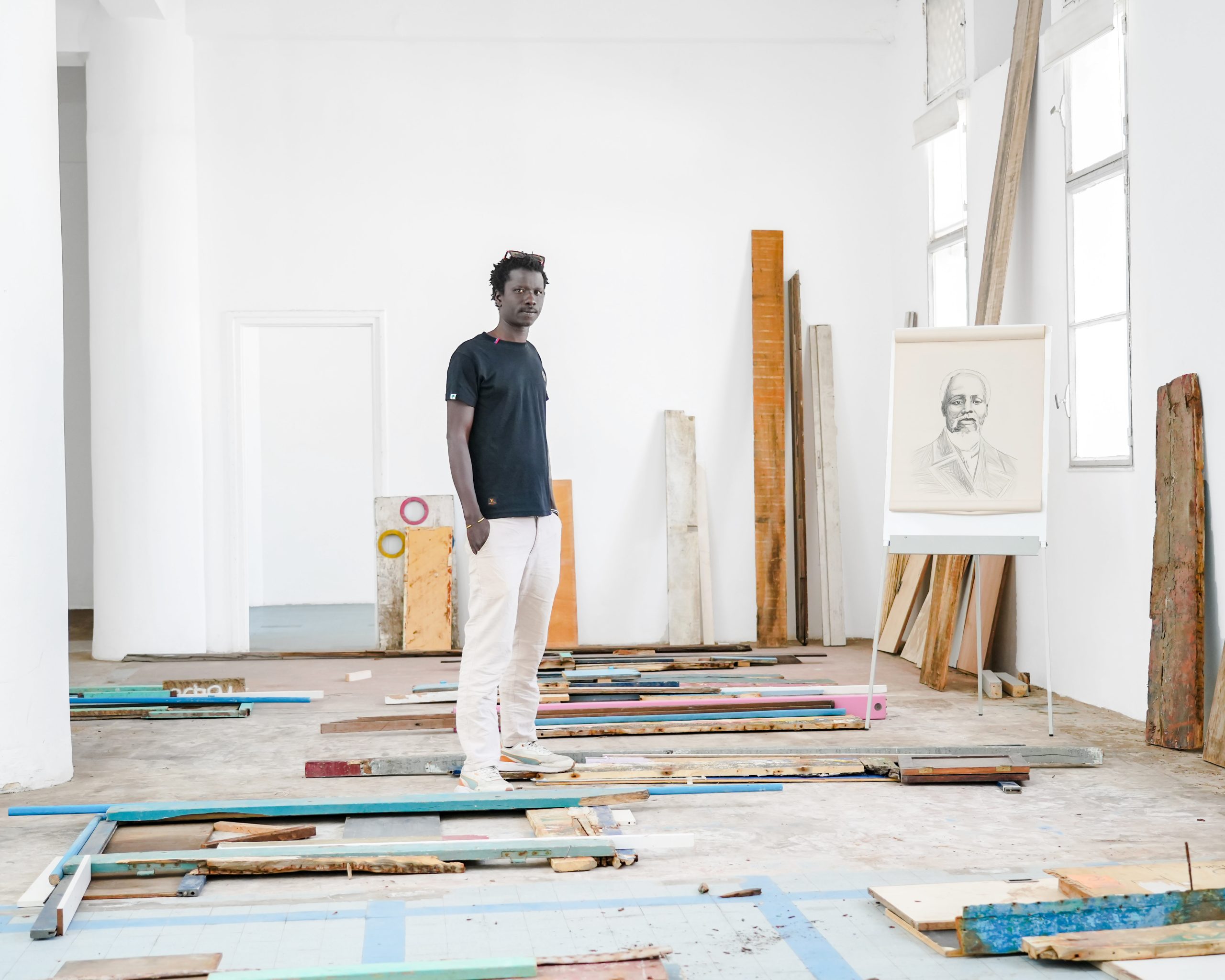
EN – Eva Diallo (1996) works with photography and extends to video and installations, weaving visual narratives from fragments, anecdotes, and her family archive. Diallo Diery, a long-term project, extends the documentation of the Fulani people begun by earlier generations. In it, the artist looks at her family through different lenses: taking images of themselves, for themselves. In Bolol, Diallo portrays her loved ones. She focuses on two of them who undertook the difficult journey to migrate to Europe. The artist often works at the margins of her subjects, capturing moments and details that nurture a sensitive understanding of aesthetic issues. Rather than contributing to the rapid consumption of images that are often generated around these topical subjects, she seeks the poetic exercise of deciphering – an act that fuels the imagination and opens multiple layers of experience.
FR – Eva Diallo (née en 1996) évolue à la frontière entre photographie, vidéo et installations. Elle tisse des narrations visuelles à partir de fragments et d’anecdotes et puise dans sa propre histoire familiale. Diallo Diery, un projet à long terme, vient encore étoffer les archives des populations peules déjà renseignées par les générations précédentes. Dans ce cadre, l’artiste observe sa famille à travers différents objectifs et capture des clichés qui représentent ce cercle familial et lui sont destinés. Dans Bolol, Diallo nous présente ses proches, en particulier deux membres de sa famille qui ont émigré vers l’Europe. L’artiste travaille souvent enmarge de ses sujets, capturant des instants et détails qui nourrissent une compréhension profonde des enjeux esthétiques. Plutôt que de participer à la consummation effrénée d’images couramment générées autour de ces sujets d’actualité, elle cherche à déchiffrer son environnement, une démarche poétique qui nourritl’imaginaire et ouvre les portes d’un vécu multidimensionnel.
EN – Babacar Traoré “Doli” (Dakar, Senegal, 1984) brings together diverse disciplines and social practice, concerned less with showing art than with living it. He devotes his energy to illuminating the work of others and has long been a driving force behind art in both public and domestic spaces. Growing up within Espace Médina, a cultural enclave in his family compound in Dakar, he developed into a leader and advocate for artistic initiatives. He has spearheaded initiatives including Dak’Art OFF, the Partcours Festival, and gallery Selebe Yoon, all while contributing to recuperative projects with Laboratoire Agit’Art and Set Setal. His work has been presented at photography biennales and festivals in Bamako and Cape Verde, at solo exhibitions in Senegal and Australia, and at numerous group shows. In 2018, he received the Creativity Prize at the Quinzaine de la Photographie Festival in Cotonou, Benin. In 2020, his work was selected for exhibition at the “Salon Géew Bi” art event of the Institut Français.
FR – Babacar Traoré “Doli” (Dakar, Sénégal, 1984) fait dialoguer disciplines variées et pratiques sociales, moins soucieux de montrer l’art que de le vivre. Passeur attentif, il met son énergie à révéler le travail des autres et demeure, depuis longtemps, un moteur de l’art aussi bien dans l’espace public qu’au cœur des maisons. Ayant grandi au cœur de l’Espace Médina, lieu familial d’art et de culture à Dakar, il devient un initiateur et un défenseur de projets artistiques. Il impulse des projets tels que Dak’Art OFF, le festival Partcours et la galerie Selebe Yoon, tout en contribuant à des projets de remédiation avec le Laboratoire Agit’Art et Set Setal. Son travail a été présenté dans des biennales et festivals de photographie à Bamako et au Cap-Vert, lors d’expositions personnelles au Sénégal et en Australie, ainsi que dans de nombreuses expositions collectives. En 2018, il reçoit le Prix de la Créativité au Festival Quinzaine de la Photographie à Cotonou (Bénin). En 2020, son travail est sélectionné pour l’exposition du « Salon Géew Bi » organisée par l’Institut français.
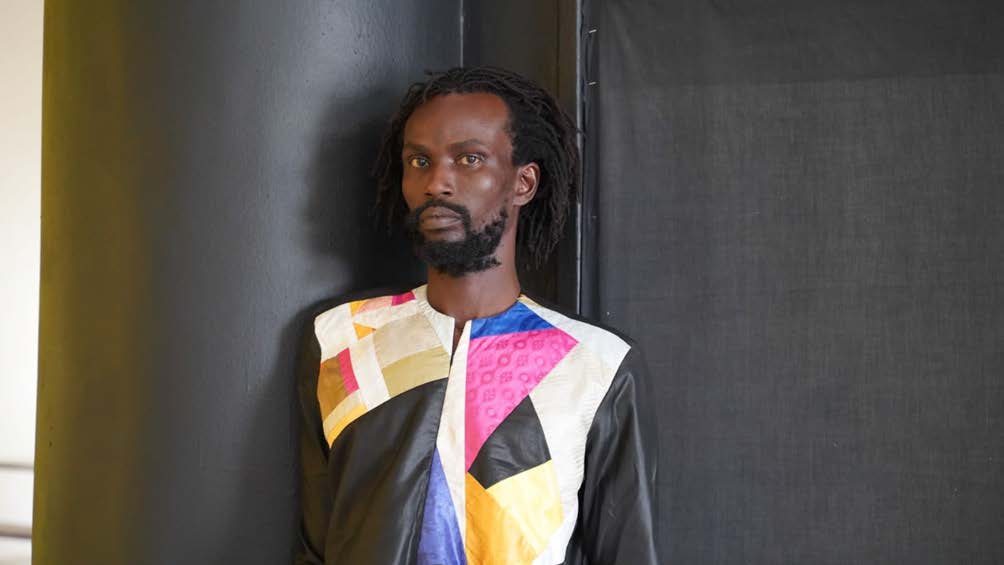
Curators
EN – Haja Fanta (London, 1994) is a curator, writer, and researcher with a diverse and international practice, dividing her time between London and West Africa. She collaborates with artists, organizations, and institutions to deliver visual art exhibitions, projects, and programs. Her research focuses on cultural policy and infrastructure in cities as well as artistic and cultural production from West Africa and its diaspora. Recently, Fanta spent three months in Dakar on an Arts Council DYCP grant, investigating post-independence art and cultural policy. Previously, she participated in the 2023 CPD-accredited Young Archivist training program by the Serendipity Institute and was a writing fellow (2023) for the Black Embodiments Studio Arts Writing Incubator. Fanta’s previous projects include collaborations with the Southbank Centre, the National Portrait Gallery, The Africa Centre, and HOME by Ronan Mckenzie in London, UK. She has written for publications like Contemporary& and Texte zur Kunst.
FR – Haja Fanta (née à Londres en 1994) est commissaire d’exposition, écrivaine et chercheuse. Sa pratique diversifiée et internationale s’est lentement développée entre Londres et l’Afrique de l’Ouest. Elle collabore avec divers artistes, organisations et institutions en vue de proposer expositions, projets et programmes autourdes arts visuels. Ses recherches portent principalement sur les politiques culturelles et les infrastructures en milieu urbain, ainsi que sur la production artistique et culturelle de l’Afrique de l’Ouest et de sa diaspora. Titulaire d’une bourse de subvention DYCP du Arts Council, cette artiste a récemment passé trois mois à Dakar pour y enquêter sur la politique artistique et culturelle post-indépendance. En 2023, elle a participé au programme de formation Young Archivists du Serendipity Institute et a reçu une bourse d’écriture du Black Embodiments Studio Arts Writing Incubator. Par le passé, Haja Fanta a collaboré avec le Southbank Centre, la National Portrait Gallery, l’Africa Centre et HOME by Ronan McKenzie à Londres. Elle a également rédigé plusieurs articles pour des publications telles que Contemporary& ou Texte zur Kunst.
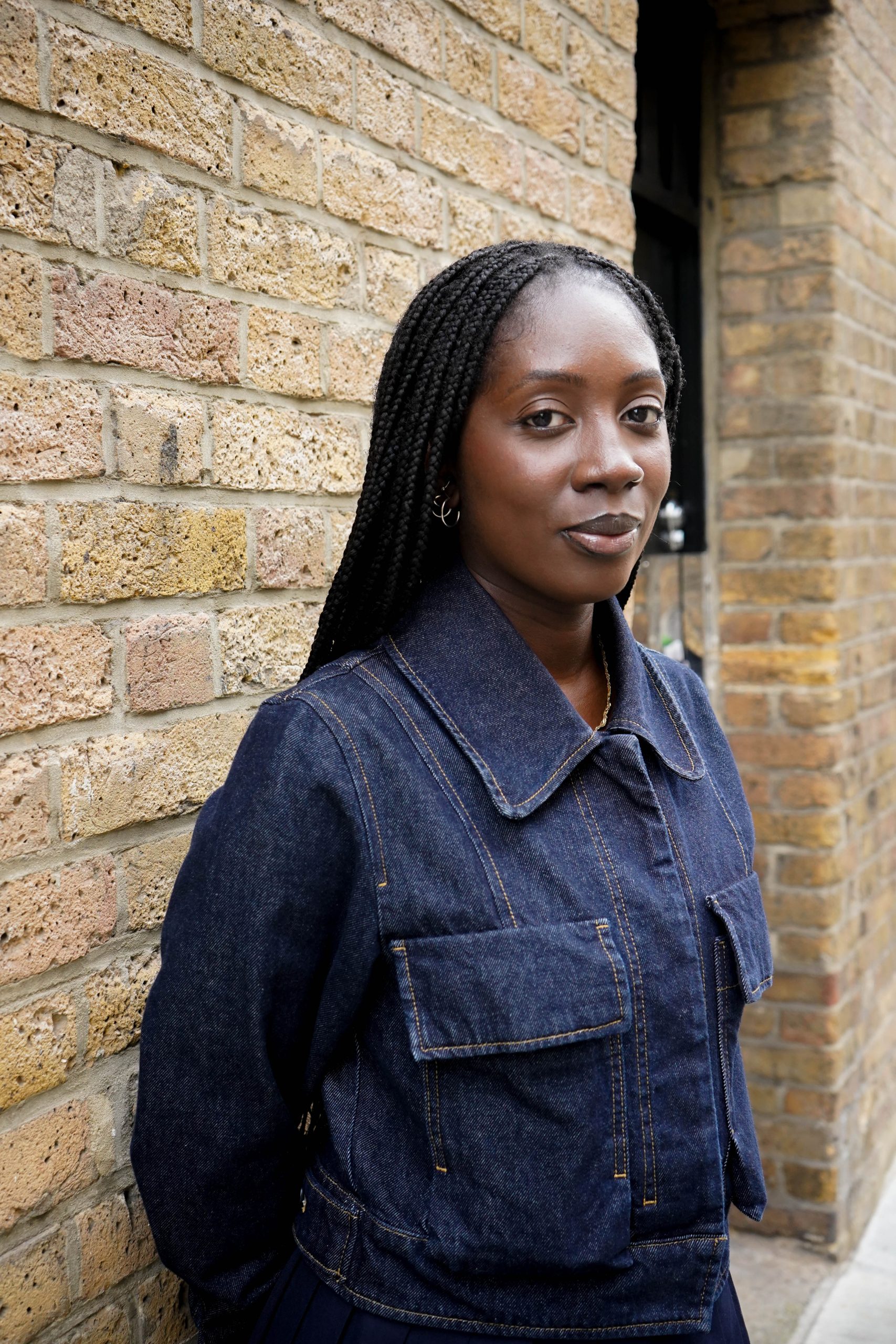
EN – Filly Gueye (New York, 1988) is a Senegalese-American curator and cultural strategist whose work explores Black identities, diasporic narratives, and processes of cultural preservation. Based in Dakar, she is Curator of Programs at RAW Material Company. Her practice centers on research-based storytelling and supporting artists through the focus on residencies, and critical dialogue around identity, belonging, and socio-cultural critique. Gueye sees residencies as laboratories for conversation and care, where curatorial practice and artistic research meet in process rather than display. She attended Princeton University’s symposium organized by Tina Campt and Tavia Nyong’o on “The Radical Practice of Black Curation,” was a moderator of the panel discussion “How Do Museums Interact with Communities?” for the EDI Global Forum (Naples, Italy), and participated in round tables at 1-54 Contemporary African Art Fair (Marrakesh, Morocco). She wrote for the 39th Hyères International Festival at the Villa Noailles, Atelier Ndokette Collective and for Verein K’s Visiting Critics Vienna (September 2024).
FR – Filly Gueye (née à New York en 1988) est une commissaire d’exposition sénégalo-américaine et stratège culturelle, dont le travail explore le identités noires, les expériences diasporiques et les processus de préservation du patrimoine culturel. Désormais basée à Dakar, elle est commissaire des programmes pour RAW Material Company. Sa pratique tourne autour de la narration fondée sur la recherche et sur le soutien aux artistes par le biais de résidences ainsi que d’un dialogue critique autour de concepts tels que l’identité, l’appartenance ou la critique socioculturelle. Pour Gueye, les résidences sont des sortes de laboratoires d’entraideet de dialogue, où se rencontrent les processus réels de pratique curatoriale et de recherche artistique. Elle a assisté au symposium organisé par Tina Campt et Tavia Nyong’o sur la « pratique curatoriale noire radicale » à l’Université de Princeton, a animé une table ronde lors du EDI Global Forum de Naples sur le sujet de l’interaction entre musées et les communautés dans lesquels ils sont ancrés, et a participé aux tables rondes de la Foire 1-54 d’art contemporain africain de Marrakech. Elle a aussi écrit pour le 39e Festival International de Hyères à la Villa Noailles, pour l’Atelier Ndokette Collective et pour Visiting Critics Vienna de Verein K (septembre 2024).

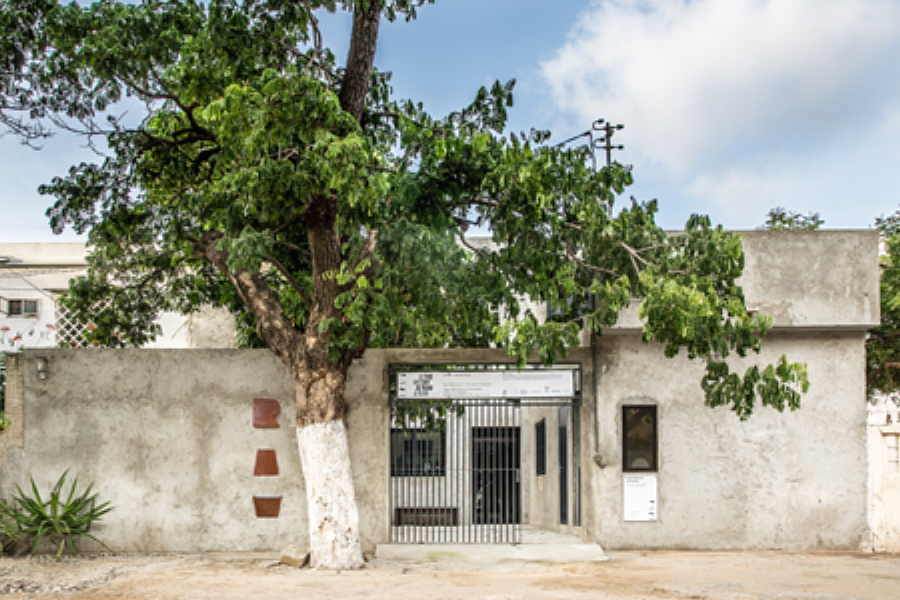
RAW Material Company
RAW Material Company is a center for art, knowledge and society. It is an initiative involved with curatorial practice, artistic education, residencies, knowledge production, and archiving of theory and criticism on art. It works to foster appreciation and growth of artistic and intellectual creativity in Africa. The program is trans-disciplinary and is equally informed by literature, film, architecture, politics, fashion, cuisine and diaspora. RAW Material Company unfolds as an interconnected space of resonance, weaving together the resource center RAW Base, the residency program, research, exhibitions, and publishing practices to nurture constellations of ideas, encounters, and shared sensibilities.
RAW Material Company est un centre pour l’art, le savoir et la société. C’est une initiative qui s’articule autour du commissariat d’exposition, de l’éducation artistique, de résidences, de la production de savoir et de la documentation de la théorie artistique et de la critique d’art. L’espace œuvre à la croissance et à l’appréciation de la créativité artistique et intellectuelle en Afrique. Le programme est transdisciplinaire et se nourrit de littérature, de cinéma, d’architecture, de politique, de mode, de cuisine et des expériences de la diaspora. RAW Material Company sert de caisse de résonance comprenant divers éléments interconnectés : centre de ressources RAW Base, programme de résidence, espaces de recherche, lieux d’exposition et pratiques d’édition. Le tout favorise un foisonnement d’idées, de rencontres et de manières de voir le monde.
rawmaterialcompany.org
DAR Cultural Agency
DAR is a Rotterdam-based cultural agency and platform representing some of the finest emerging contemporary talents in art, design, and architecture. DAR is built as a solid home, aiming to provide space for creative growth through cultural programming, thoughtful curation, and meaningful collaborations between talents, museums, brands, and communities.
DAR est une agence basée à Rotterdam qui entend représenter les meilleurs nouveaux talents dans les domaines de l’art, du design et de l’architecture. DAR a été conçue pour proposer des espaces où peut fleurir la créativité par le biais d’une programmation culturelle stratégique, d’un travail curatorial réfléchi et de collaborations pertinente entre les artistes, les musées, les marques et les communautés.
dar.nu
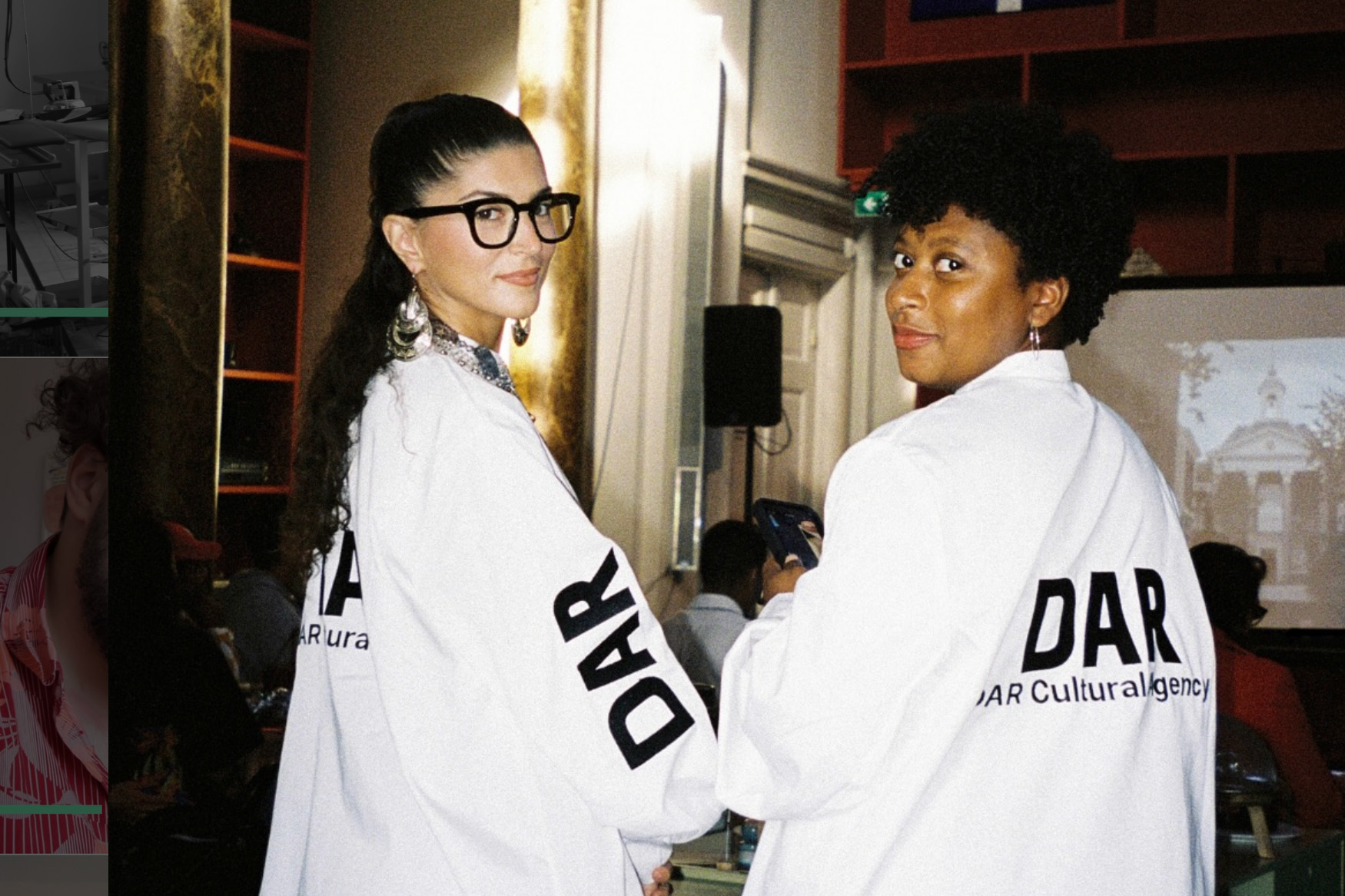
Porous Grounds Podcast
On Sunday afternoon, December 21, the Porous Grounds, Sacred Codes artist talk took place.
The curators Filly Gueye and Haja Fanta (RAW Material Company) engaged in conversation with the participating artists: Yacine Tilala Fall, Selly Raby Kane, Maguette Dieng, Hamedine Kane, Eva Diallo, and Babacar Traoré ‘Doli’. Together, they shared insights, stories, and experiences from the creative process behind this special group exhibition. The conversation was followed by a Q&A session with the audience.
Listen to this edited artist talk via your favourite podcast app. Search for Marres – Sensing Art, Training the Body
Sound bites
The artists of Porous Grounds, Sacred Codes reflect on their experience of this collective process and on the ways their artistic practices unfold within the exhibition.
Yacine Tilala Fall (English)
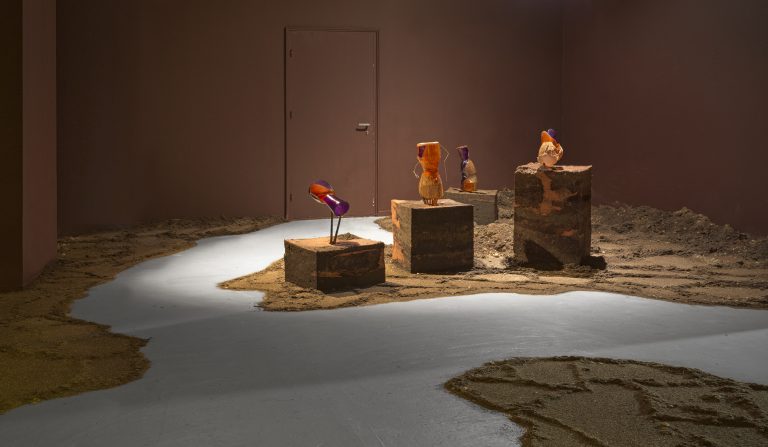
Selly Raby Kane (English)
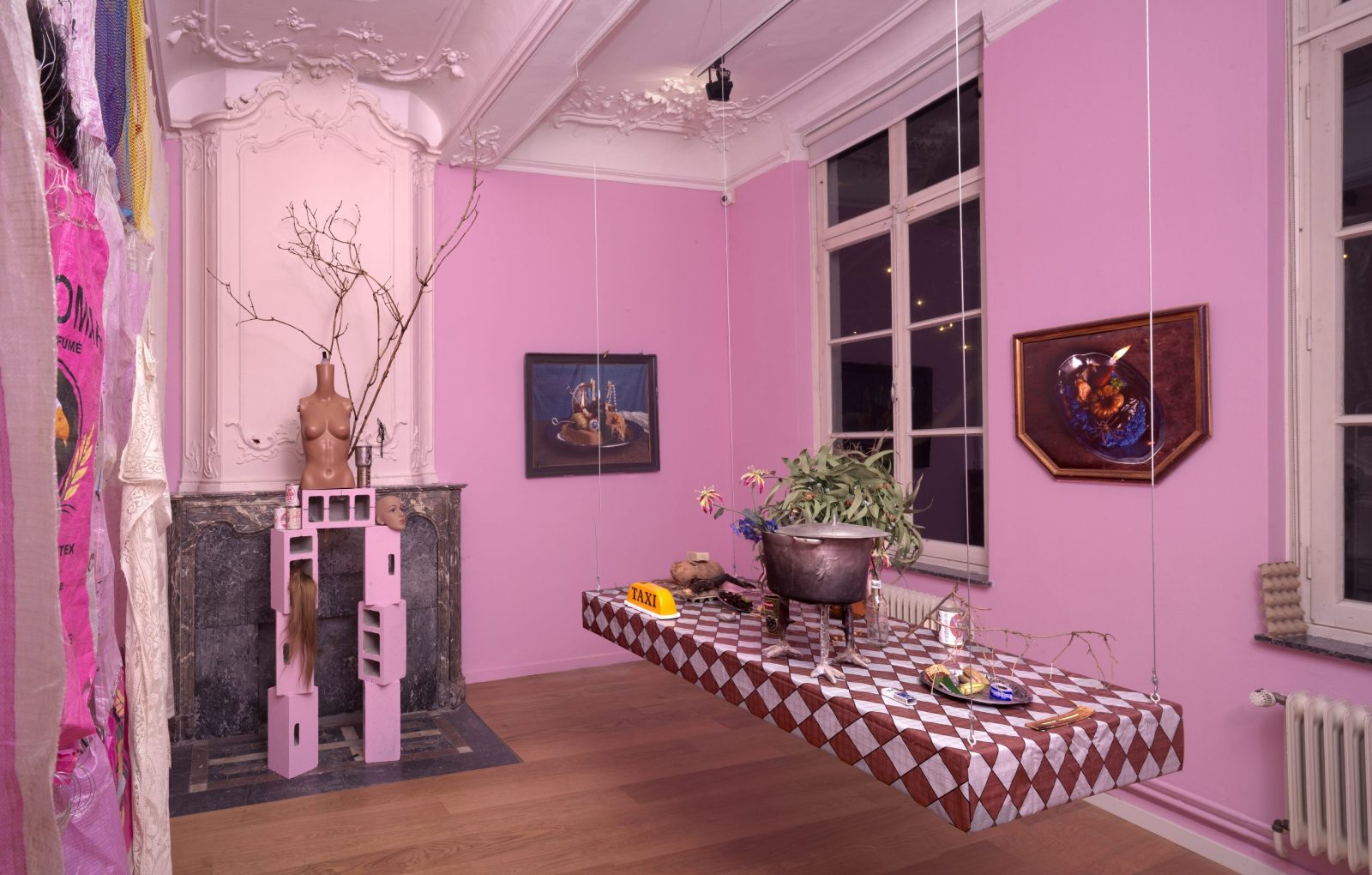
Maguette Dieng (English)
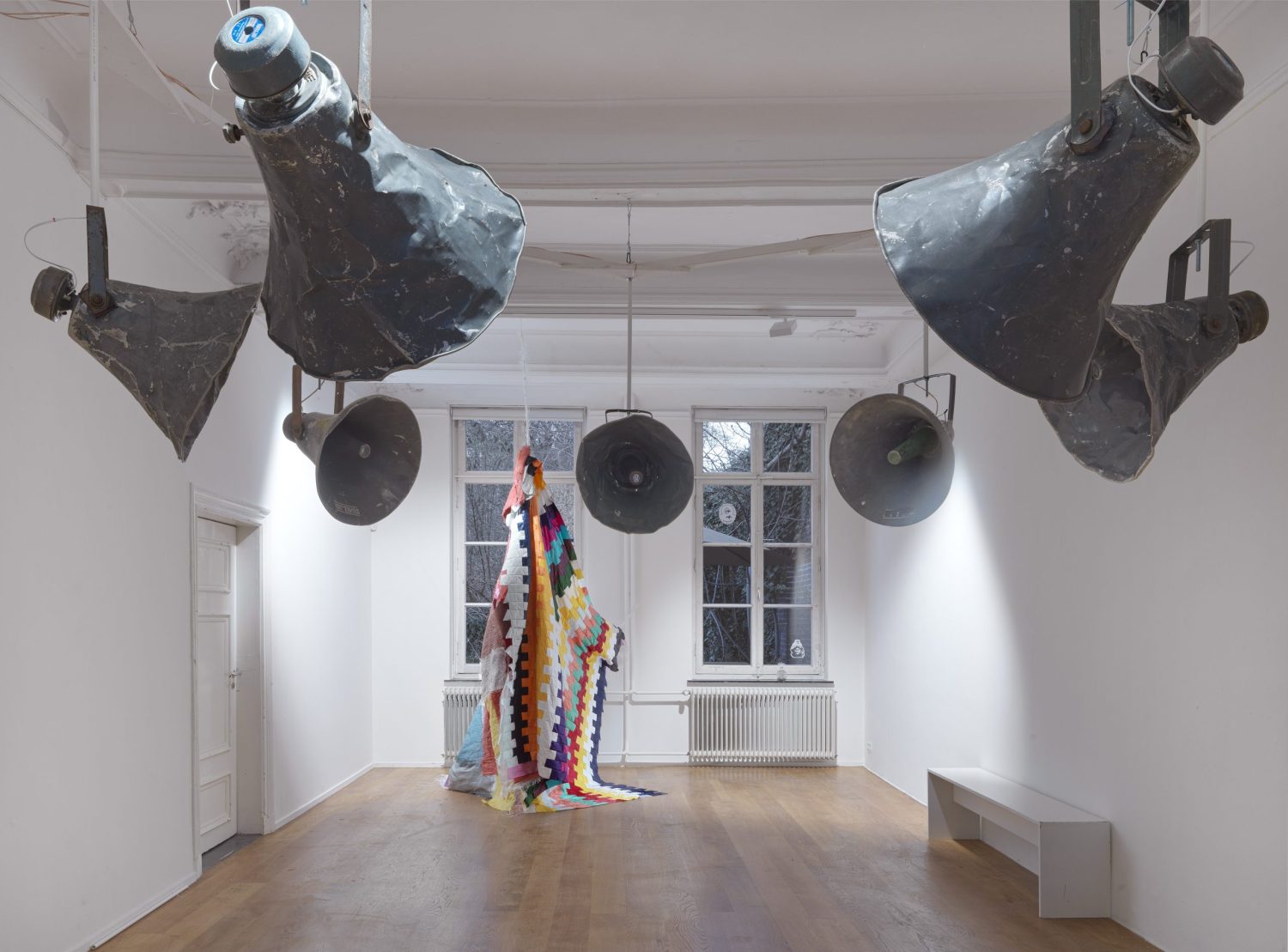
Hamedine Kane (French)
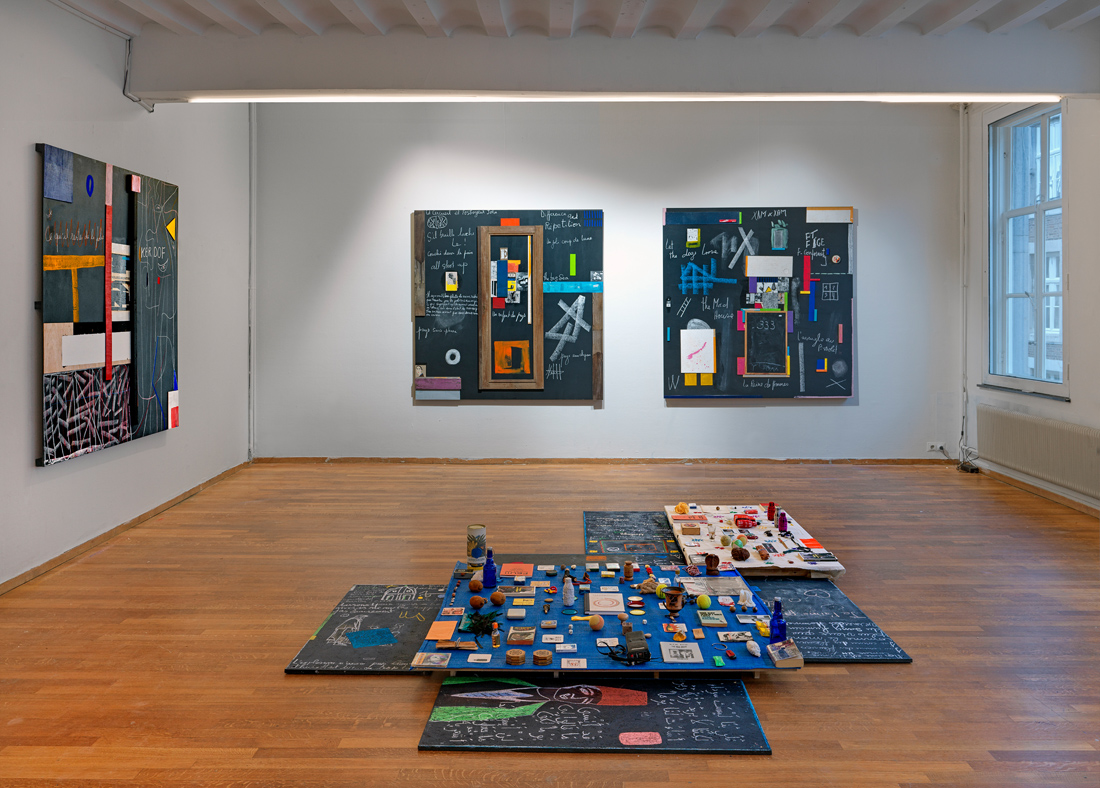
Eva Diallo (English & French)
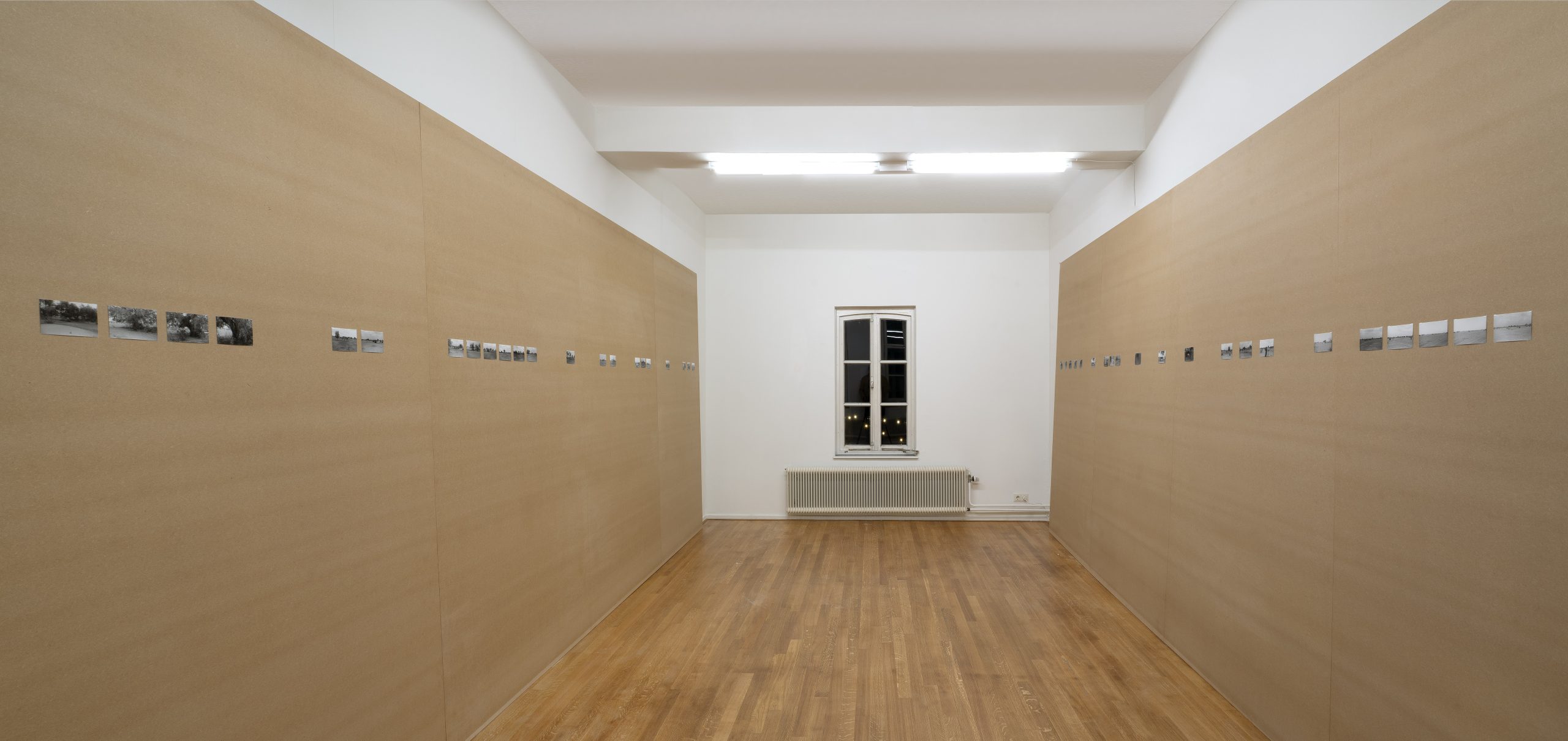
Babacar Traoré Doli (French)
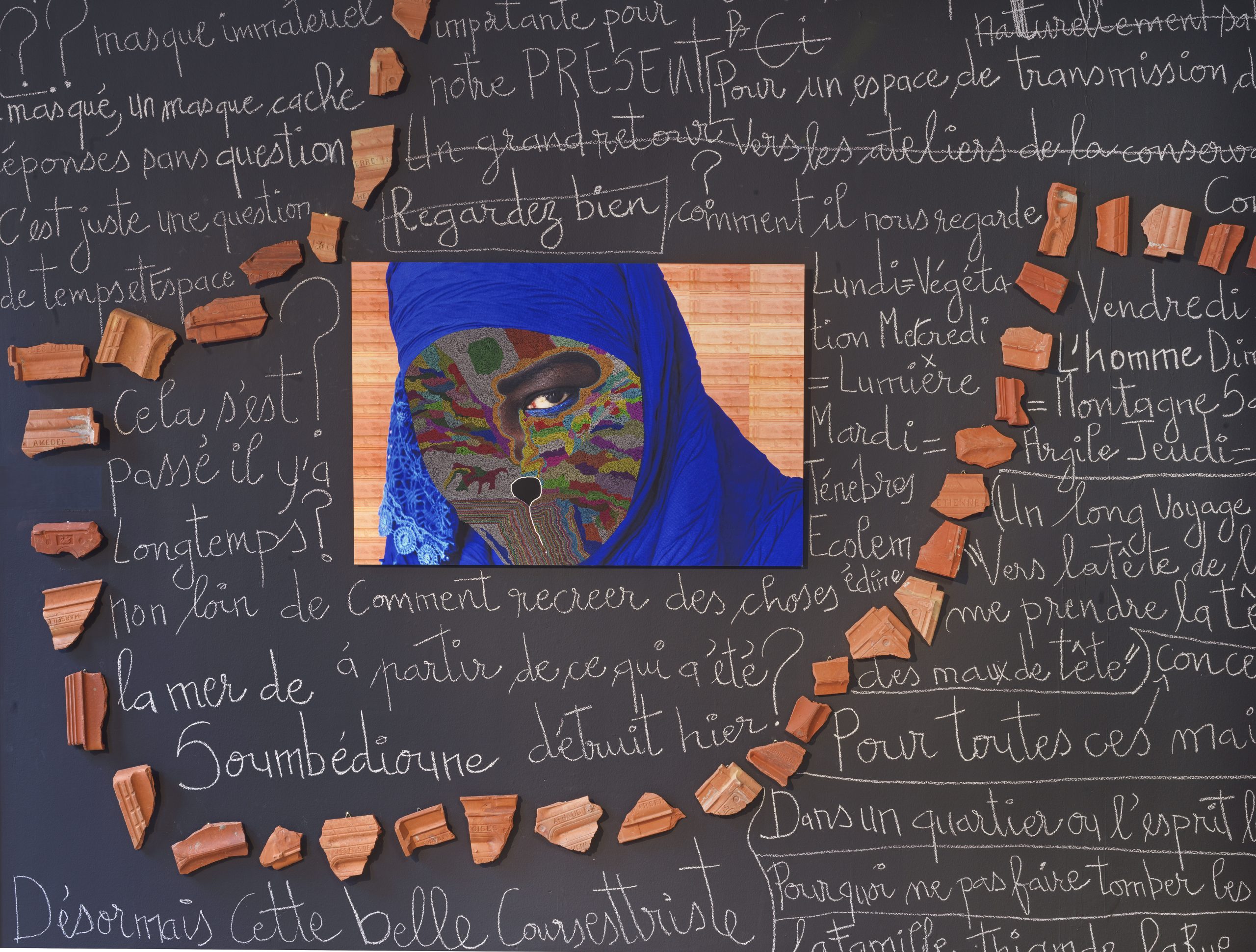
Press
For press requests, imagery and interview requests, please contact communicatie@marres.org
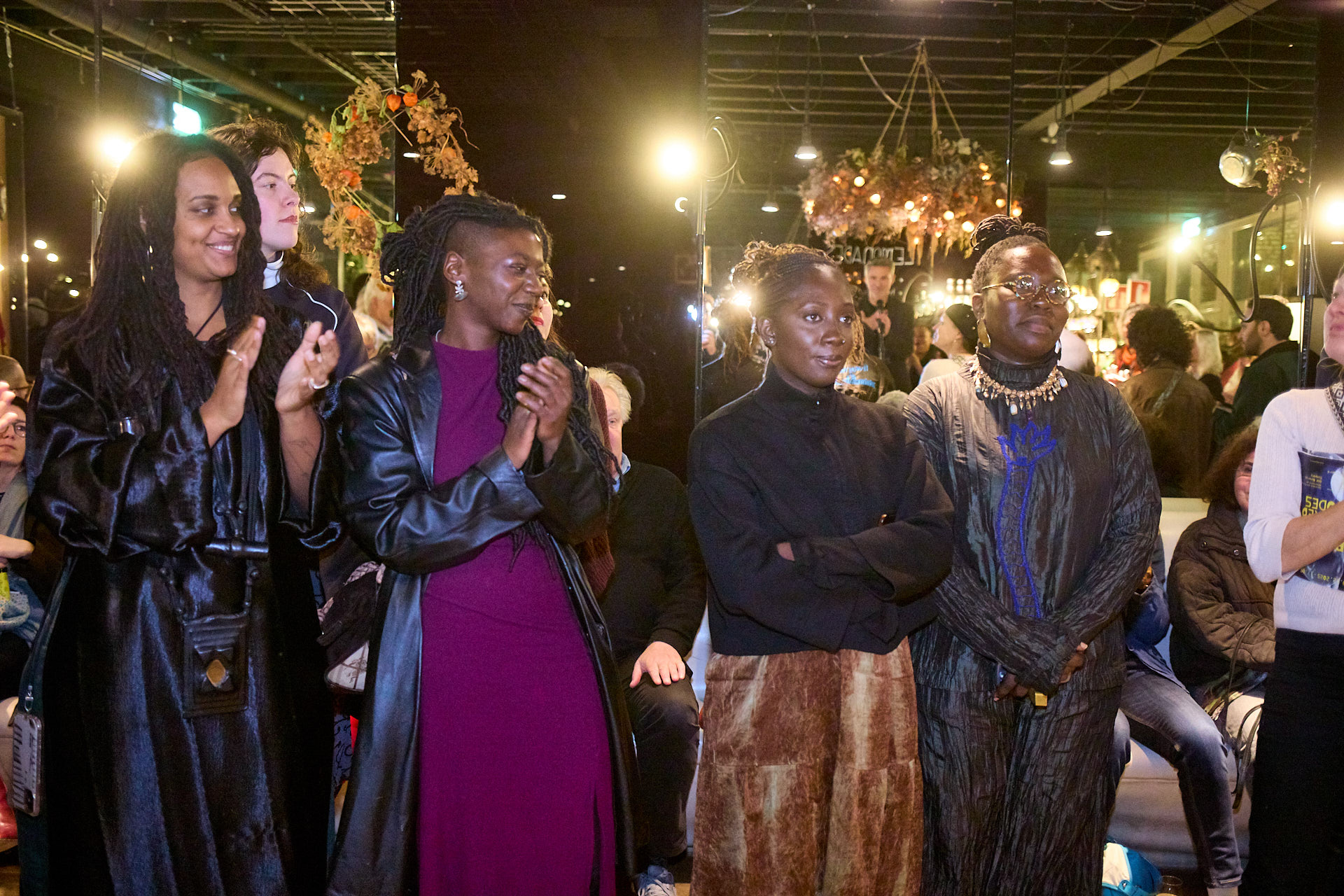
Grand opening Porous Grounds, Sacred Codes
The grand opening of Porous Grounds, Sacred Codes took place on 20 December, 2025.
Location:
Marres, Maastricht
Porous Grounds, Sacred Codes Artist Talk
On the afternoon of Sunday, December 21, you are warmly invited to the artist talk for Porous Grounds, Sacred Codes.
Watch and listen to the full conversation on YouTube.
Partners / thanks to:
Partners: RAW Material Company and DAR Cultural Agency
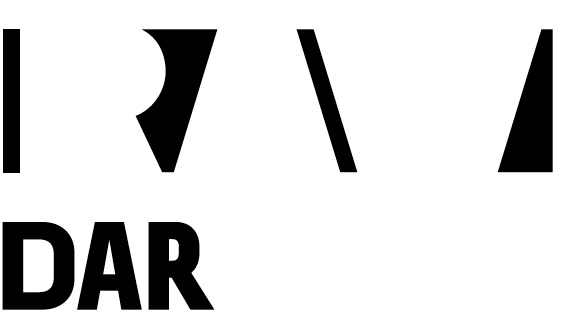
Porous Grounds, Sacred Codes is generously supported by: het Cultuurfonds, with special thanks to the Margarethe Petronella Fonds, VSB Fonds, Elisabeth Strouven Fonds, Stichting Kanunnik Salden/Nieuwenhof, Stichting DOEN.

Marres receives structural support from the Ministry of Education, Culture and Science, the Province of Limburg, and the Municipality of Maastricht.

